#in an openly homophobic family its so wild to me!!!!
Explore tagged Tumblr posts
Text
Idk why I'm thinking about this but it's still so wild to me the way I basically had to teach white gay people I used to be friends with about gay culture but then when they finally got into certain aspects of it they would talk down to me about it like I didnt know and wasnt the one who literally told them about it
#i just saw one of the og queens from drag race while scrolling online#and remembered when we got into discussions on drag in general and they were clueless#but then later they got so heavily into the show and id sort of gotten tired of rupauls shit so id falled off#and they acted like i hadnt seen like most of it for the entirety of my childhood#like my uncle in the glass closet made us watch it as a kid we watched so many gay classics#in an openly homophobic family its so wild to me!!!!#like my moms family found gay people acceptable as long as they were objects of entertainment or fantasy#but the second they reminded you gayness was real *HOMOPHOBIA ACTIVATED*
3 notes
·
View notes
Text
It's sometimes called the Tautological Templar problem. It happens with every bias, but it's especially visible with antisemitism (and antiblack racism, for that matter), because those things in particular LOVE to disguise themselves in forms that might fly under the radar.
"I am good. My every action and belief is good because I am good. Therefore I am good because my every action and belief is good. I know my every action and belief is good because I am good."
It happens a LOT when people make "anti-bigotry" a core part of their identities. Unfortunately, it's easier to call yourself An Anti-Fascist Leftist than it is to actually unpack every bigoted belief that's gotten into you from the bigotry stew we're all simmering in.
I openly admit that I am still a little bit racist even toward communities I'm part of - not on purpose, not as in, I openly and consciously think they're Lesser than others, but as in, well, I'm not immune to not noticing that a joke is racialized and shitty if the target is sufficiently abstracted, because I don't know every stereotype ever, consciously OR subconsciously - there have been antiblack urban legends that, despite having Black immediate family, I've just ASSUMED were OBVIOUSLY about rich white teenagers because I just sort of forgot that not everyone has my experiences dealing with them and yeah, that totally seems like a 17-year-old-white-boy-on-spring-break thing to do. There have been antisemitic tropes that I, despite being Jewish, didn't pick up on until pretty well into adulthood, and I had to learn the hard way, after encountering the worst kinds of people in the wild, that most people who point out the other groups targeted by the nazis AREN'T doing so as a call for solidarity the way my family did to me. I'm also not immune to things like getting frustrated with language barriers, and I wholeheartedly acknowledge the need to be careful to prevent that from turning into something worse in an environment that really, really wants that "something worse" to grow like kudzu - better to admit that it's on me, dismiss any shitty associative thoughts, and acknowledge my imperfection than let it convince me that "no, no, its not that I think not learning English is lazy, just that THIS person in particular [every single individual I struggle to communicate with] was being RUDE about it and has NO excuse". Becoming not-bigoted is a lifelong process, there's always an unchecked assumption your family made, or an assumption your family checked but forgot to tell you about because people tend to forget that people aren't born with "common knowledge" - it's never over.
The problem is that way too many people assume that the moment they decide to self-identify as A Leftist, the process IS over. They've done it. They're officially, now and forever, Not Racist, Sexist, Ableist, Xenophobic, Antisemitic, Homophobic, or Anything~!
And it needs to stop, or at least stop being so damned loud and infecting everything.
I'm just saying, Neo-Nazis and Leftists should be easier to tell apart when it comes to them talking about Jews. You know. Ideally.
10K notes
·
View notes
Text
So.. About That Hickey..
I think I’m still processing all of this and reminding myself I’m not dreaming 🤣 I seriously only got 3 hours of sleep last night and when I woke up the first thing I did was check twitter to be sure this “drunk bridal-style spinning hickey neck biting proudly showing off” moment actually happened!!
.. I hate the way my brain works though. I was so happy that it took me forever to fall asleep, spent all day on cloud 9 despite being tired, .. and then my old nemesis, anxiety, stepped in. Well kind of. TBH if all of the MOTS ON:E Jikook moments we got happened with Jimin/anyone else or Jungkook/anyone else.. I would seriously be sitting here saying “well fuck.. I believe they WERE a couple, but looking at all of this it seems they are no longer together.” So really, this just confirmed what I already knew about Jimin and Jungkook: they’re a couple. My anxiety is over.. why? Why show us this? If they can cover all of JK’s tattoos, a hickey/bite mark/whatever we’re calling it should be super easy to hide. Sure it was just rehearsal.. but it was rehearsal with cameras rolling with every intention of releasing what was being filmed as future content. It could have (and some might argue should have) been covered.
Guys... I’m confused. And concerned. ❗❗❗ TW for drama, hate, homophobia, the usual anti issues
That “official” explanation.. again.. why? I’m assuming Jimin and Jungkook were asked and allowed to explain because of the chance of it being spotted and armys freaking out, so BH (or possibly even Jikook) thought to get ahead of the speculation by just being up front about it all.. but THAT explanation? I suppose it works for covering up the army panic of “Jungkook has a girlfriend?! *insert fangirl sobbing*” .. but that’s literally all it does (and only barely if you go looking at some of the anti’s reactions to it all). Really, all it did was draw even more attention and speculation. I mean.. this is, essentially, what we were told: Jimin and Jungkook were together the night before drinking, apparently without the other members as they didn’t seem to know all of this already (and they would have if they had been there), somehow hanging out and having drinks turns into Jungkook picking Jimin up bridal style (random but some of the k-army reactions on twitter were translating through google into “princess style” and I just think that’s so cute 🥰), spinning ensues, Jimin gets dizzy and wants Jungkook to put him down, ... and so he proceeds to do the only logical thing that any of us would have done in that situation... biting Jungkook’s neck? And hard enough to leave a mark the next day?? And instead of being peeved about it (like most of us would have been if our friend bit the crap out of us), Jungkook looks happy?? proud even???
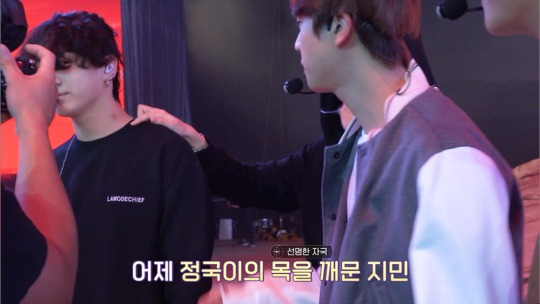
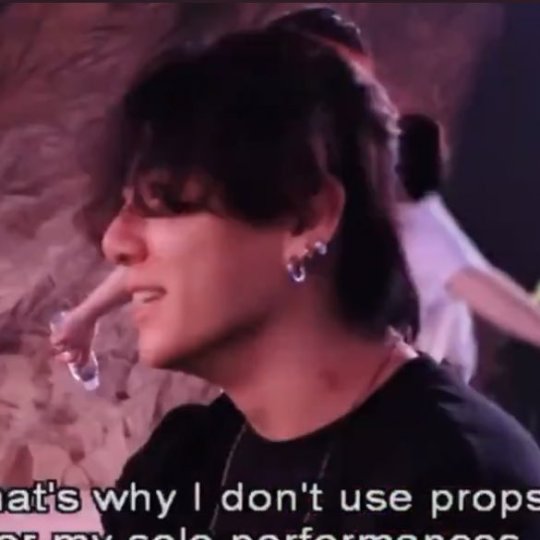
And they arrived together the next day and continue to be cute and playful?
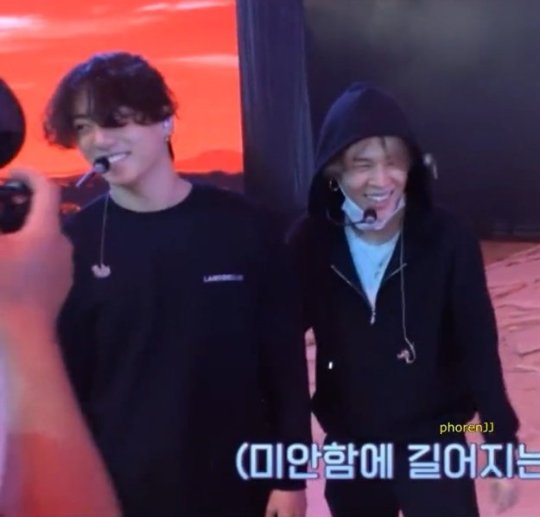
I just.. I mean.. come on. First of all.. that’s a hickey. A bite leaves teeth marks. And one would assume a wild, drunken “let me down” chomp would be something that happens suddenly and ends very quickly. I know I for sure would drop someone on their ass if they decided to take a bite out of my neck (assuming I was even picking up and spinning around with one of my friends like that to begin with.. but let’s not even get into why that was going on at this point) .. but the way this bruised? Yeah. There were no teeth involved (at least not hard enough to leave indentations) and this took more than a couple of seconds of mouth-to-neck contact to still be that visible the next day. So.. in short. Jungkook arrives with a hickey, JK decides to not cover it up (or he would have shown up with it hidden and we see him get out of the car that morning with it clearly visible), BH staff sees it and also decides to not have it covered up and actually have it explained... and the explanation is “oh yeah Jimin just bit him, you know.. no big deal hehehe isn’t that funny?” 🤯 WHAT?! Yeah.. that’s totally normal, platonic behavior between adults...
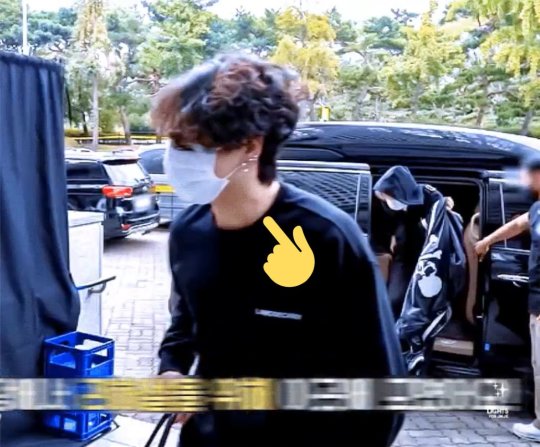
I’m not saying Jimin and Jungkook are lying btw. I have no doubt it played out more or less exactly as they said with the exception of what they’re calling the end result. Jimin and Jungkook are fine.. I mean, what were they supposed to say? They’re not going to show up saying Jimin was sucking on Jungkook’s neck the night before. We’ll probably never know why Jungkook decided to not cover it up before arriving, but it’s his body and he gets to decide. It’s BH that has me so puzzled. Other than antis and people who refuse to see what’s literally right in front of their faces when it comes to Jikook.. who were BH expecting to believe the bite thing? Just among staff and the other members, it’s a laughable but safe “oh of course *wink wink*” explanation that allows everyone to carry on like normal. But to the public who don’t know them personally, don’t know their usual behavior and patterns, and who don’t have something like a non-disclosure agreement or professional courtesy preventing them from openly speculating.. it doesn’t fly. Pretty much everyone teen and up knows what a hickey looks like (either from having gotten/given one or at least seeing one on someone else in person or online). It’s immediately obvious what it is. And even if there was some uncertainty.. that it’s on his neck (instead of other easily accessible and less sensitive/stimulating locations) and just so happens to be right near his mole as it Jimin were aiming for it? Just another “too many coincidences” thing when it comes to Jikook.
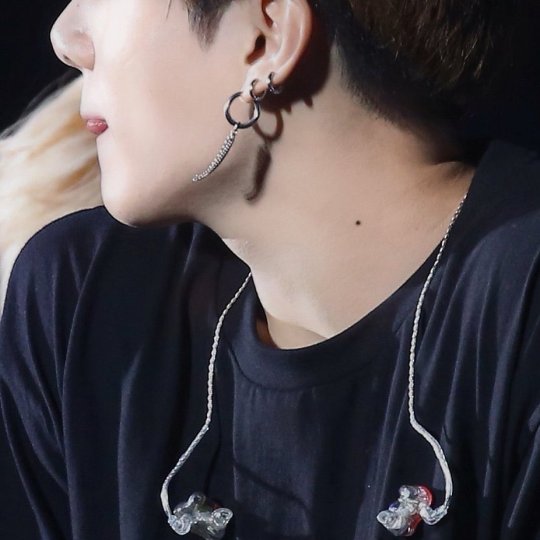
Even antis on twitter couldn’t deny what it was and, so, had to resort to the “well I do that with my sibling and my uncle’s pet raccoon all the time it’s just family things” excuse and/or the “yeah well someone ELSE in the group (or a girlfriend) gave him that and they’re just covering by saying it was Jimin.” Oh. And the same old “it’s just fan service” excuse (as if Jungkook would let someone bruise his neck for the purposes of fanservice which, again, BTS has never done or needed to do. Forever pissed off that so many in this fandom act like Jungkook is a puppet doing whatever the “evil company” tells him to do regardless of his personal feelings or boundaries. The man has tattoos covering nearly every inch of his arm despite that being looked down on in Korea. At this point he can do whatever the fuck he wants). So.. why?? Seriously, why? This all could have easily been avoided with simple makeup.
When they’re doing official content they’re all literally followed around by a flurry of staff fixing hair, dabbing sweat, touching up makeup, etc. Even though it was rehearsal, staff were everywhere in the footage that’s made its way online. If they were worried that it would be seen in the background and “taken the wrong way,” just have the staff occasionally touch up the makeup. “Easy peasy lemon squeezy.” But instead of doing the obvious, BH decides to: not cover it, draw attention to it by asking about it and letting them continue to talk about it, go out of their way to get a camera on it, and then include it in the final cut of the content they sent out?
BTS is literally the most popular group in the world right now and BH has become a behemoth of a company that runs like a well-oiled machine. They’re not stupid; this was not a mistake. For some reason they wanted us to see this and, one would assume based on the lack of a more believable explanation, they wanted us to come to the conclusion that we all have: Jimin gave Jungkook a hickey. You know they have teams dedicated to monitoring reactions to content on social media. You know they know the dialog surrounding Rosebowl, Black Swan MMA, the Memories 2020 “almost kiss,” etc. etc. All of this got “jikook,” “hickey” and variations of their names trending for HOURS (in multiple countries and worldwide).
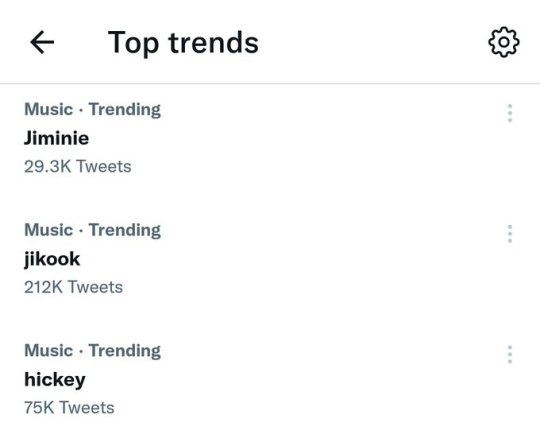
Out of curiosity, I decided to check the trends at the time of writing this. As of 3 AM CST (about 24 hours AFTER the clips started showing up online), there was still a hashtag trending related to all of this: #FREEJUNGKOOK.. and the tweets being directed toward BH are.. disturbing to say the least:
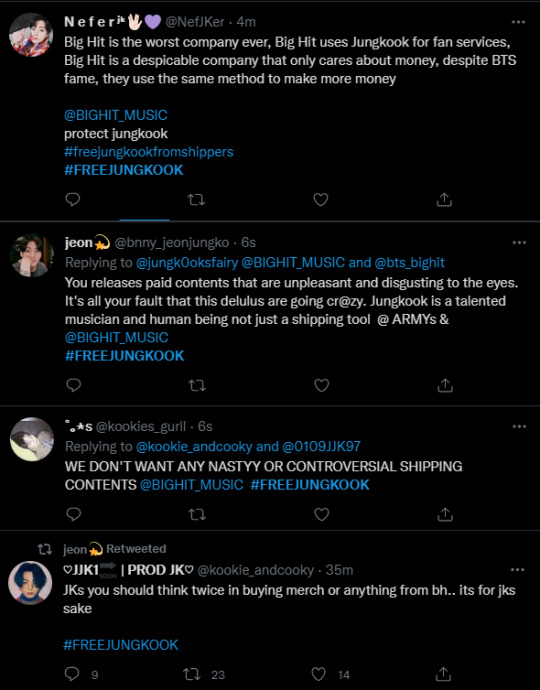
While I agree that the boys should trend more often based on their talents and music.. what’s going on right now is a homophobic 💩 show accusing BH of “scripting” interactions (rather than.. you know.. Jungkook interacting with whoever he wants however he wants.. the usual “mindless puppet JK” narrative), trying to coordinate the mass sending of angry emails, trying to get people to stop buying paid content, accusing BH of taking advantage of the members.. I mean it goes on and on. And BH know what’s going on right now. They’re seeing the reactions... the good and the extremely negative. And still they let this out. And this is all not even CONSIDERING the mountain of other moments that made the cut on MOTS ON:E.
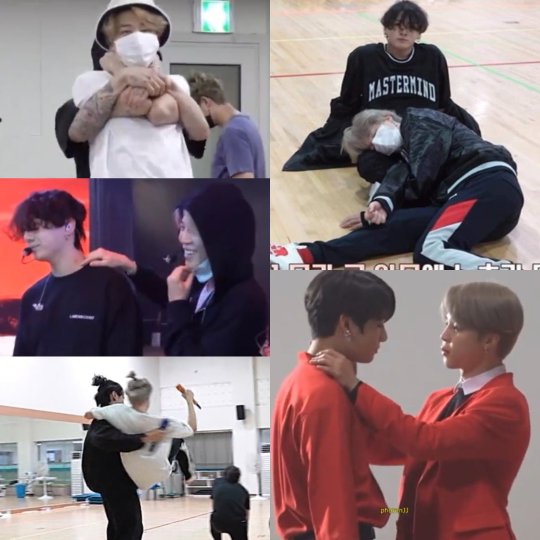
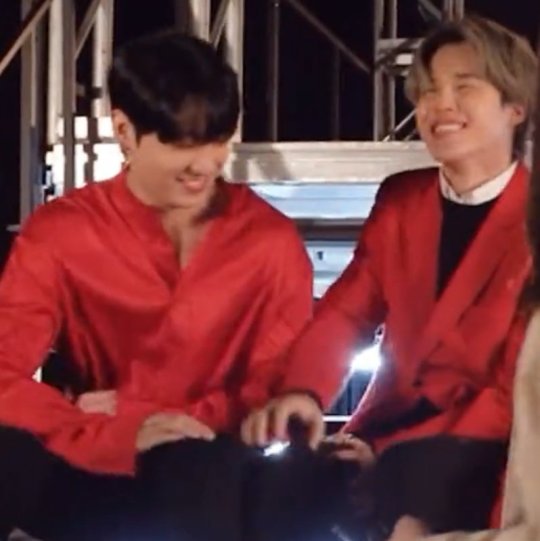
(side note, the above pic just oozes happiness and it’s so cute I love it!! 😭)

So.. even though I’ve said it dozens of times already... WHY? W H Y? I’m an anxious person by nature and not very trusting. I believe Jimin and Jungkook and I don’t think they’ve been lying and pretending for “fanservice” all of these years. I respect them both too much as individuals and artists to believe that they would stoop to such tactics just to generate a little more “interest” and revenue. I’m suspicious of BH. BTS doesn’t need fanservice to get attention; literally all of 2020 and 2021 so far has proven that beyond a doubt. Even if they suddenly made the decision to do fs.. why not go with the most popular ship (taekook) or at least one that isn’t so hotly debated on social media (remove Jimin, Jungkook and Tae from the equation and you still have four members to “play” with who have much less potential to have fs devolve into a toxic crap show all over the internet). Showing us this will do nothing to help BTS as a group or Jimin and Jungkook at this point. In fact.. all it can do is hurt. Hurt BH, hurt the group, and hurt the individual members, heck.. even potentially hurt other BH/HYBE groups. I’ve already seen people on twitter saying they’re “done” spending money on anything BH or BTS puts out because they’re “sick of jikook in their faces and just two of the seven hogging all of the screen time.” Whether or not that “spending freeze” actually materializes into anything noticeable remains to be seen of course.. but the threat is there and always has been. What is the motive? And why now? As much as my “hopeless romantic” heart would like to believe they’re preparing us for Jikook to be “out” .. I seriously don’t think that is ever going to happen. Certainly not now at the height of the group’s fame, with them being given Presidential honors and ambassador status, and with military service still looming over them all. And let’s not forget... Korea is NOT a safe place for a queer couple. Letting us see and know what they did through what was released has the potential to put Jimin and Jungkook (and the other members by proxy) in danger. Sure.. BTS has never been hardline rule followers and have been breaking molds and shattering norms from the start, so “officially” having an openly gay couple in the group wouldn’t be impossible.. just... highly highly improbable. Especially right now... and I’m concerned. I don’t want to sound like the creeps I posted a screenshot of above throwing blame at the company. The boys chose to renew their contracts with the for a reason so we have to trust their judgement as a group... but still, I’m worried and I’m questioning what the purpose was here.
16 notes
·
View notes
Photo

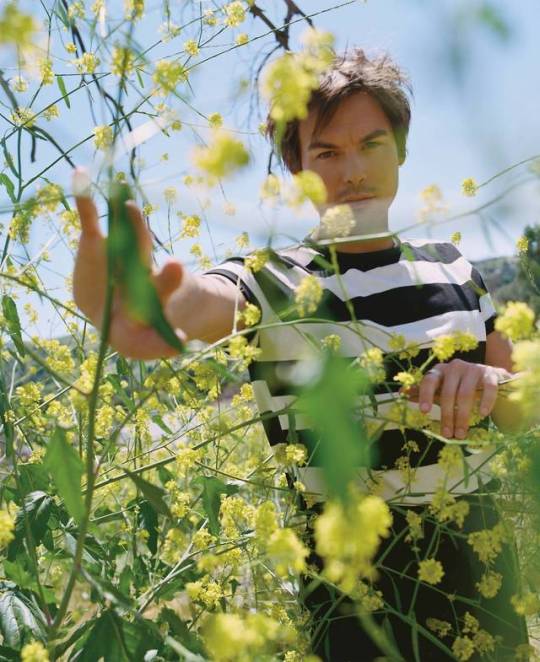

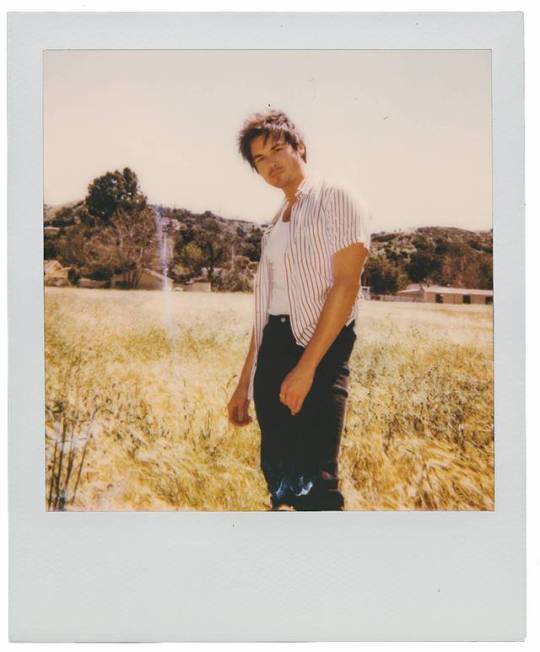
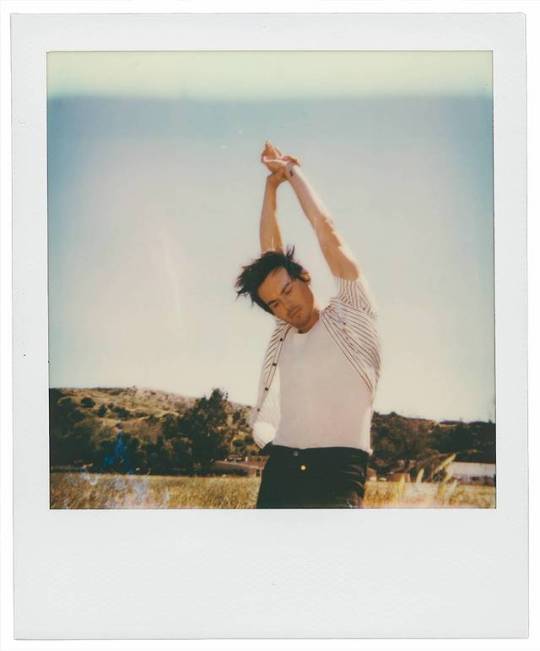
Down to Earth With Tyler Blackburn
I‘ve never met Tyler Blackburn before—except that I have. Maybe it would be more accurate to say I’ve met versions of Tyler Blackburn. I’ve spent time with the actor on multiple occasions while covering his TV series Pretty Little Liars, the soapy teen-centered murder mystery that regularly generated more than a million tweets throughout its seven-season run. Just two weeks ago I reconnected with him in a lush meadow of flowering mustard outside Angeles National Forest, the site of his PLAYBOY photo shoot. But the Tyler Blackburn I’m meeting today at his home in the Atwater Village neighborhood of Los Angeles is in many ways an entirely different man.
When he greets me at the front door, Blackburn is relaxed, barefoot and still wearing what appears to be bed head. His disposition is unmistakably freer—lighter—than it’s been during our previous encounters. Perhaps I shouldn’t be surprised by this. Six days earlier the 32-year-old actor came out publicly as bisexual in an online interview with The Advocate.
The announcement is clearly at the forefront of his mind as we sit down at his dining room table.
Almost immediately he starts to gush about the positive, and at times overwhelming, feedback he has received over the past few days. Within minutes he’s in tears. He tries to lighten the mood with a self-effacing quip, but now I’m in tears too. Then he tells me he can’t remember my question.
I haven’t even asked one yet, I reply.
“It just makes me feel, Wow, the world’s a little bit safer than I thought it was,” Blackburn says.
The most affecting response he’s received thus far has been from his father, whom Blackburn didn’t meet until he was five years old. Although he avoids offering any more details about that early chapter, he says, “Feeling like I’m a little bit different always made me wonder if he likes me, approves of me, loves me. He called, and it was just every single thing you would want to hear from your dad: ‘That was a bold move. I’m so proud of you.’ It was wild.”
Blackburn can’t pinpoint the exact moment he knew he was bisexual but says he was curious from the age of 16. It wasn’t until two years ago, though, that he decided to approach his publicity team about coming out publicly. At that point, Pretty Little Liars had wrapped, and the actor was without a job. So Blackburn and his team agreed they needed to hold off on making an announcement until his career was stable again. The lack of resolution weighed on him. “A year ago I was in a very bad place,” he says, adding that he has struggled with depression and anxiety. “I didn’t know what my career was going to be or where it was going. My personal life—my relationship with myself—was in a really bad place.” His casting on the CW’s Roswell, New Mexico, adapted from the same Melinda Metz book series as the WB’s 1999 cult favorite Roswell, seems to have come at the right time. Blackburn portrays Alex, a gay Army veteran whose relationship with Michael, a bisexual alien, has attracted legions of “Malex” devotees since the show’s January debut. Roswell, New Mexico has already been renewed for a second season—a feat for any series in this era of streaming, let alone one involving gay exophilia. Playing a character whose queerness has been so widely embraced by fans no doubt nudged Blackburn closer to revealing his truth for the first time since becoming an actor 15 years ago. (As he told The Advocate, “I’m so tired of caring so much. I just want to…feel okay with experiencing love and experiencing self-love.”) Still, he was somewhat reluctant. His hesitation was rooted in the fact that he wouldn’t be able to control what came next: the social pressures that often come with being one of the first—in his case, one of the first openly bisexual male actors to lead a prime-time television series. “If you stand for this thing, and you say it publicly, there’s suddenly the expectation of ‘Now your job is this,’ ” he says. “Even if someone’s like, ‘Now you’re going to go be the spokesperson’—well, no. If I don’t want to, I don’t want to. And that doesn’t mean I’m a half-assed queer.” Full disclosure: I previously wrote for a Pretty Little Liars fan site. In 2012 I published a listicle that ranked the show’s hottest male characters. Blackburn cracks up when I tell him this and wants to know whether he bested Ian Harding, his former co-star. After I inform him that his character (hacker with a heart of gold Caleb Rivers) finished second behind Harding’s (Ezra Fitz, a student-dating teacher) I promise to organize a recount. The always-modest Blackburn concedes that Harding is the rightful winner. (If anyone ever compiles a BuzzFeed article titled “Most Embarrassing Moments for Former Bloggers,” I’ll be offended if I’m not in the mix.)
Blackburn makes it clear that he has not always been comfortable with his status as a teen heartthrob. Knowing he was queer made it “hard to embrace it and enjoy it.” Growing up, he was bullied for being perceived as effeminate and was frequently subjected to slurs and homophobic jokes. He describes himself as a late bloomer who took longer than usual to shed his baby fat. He didn’t have many friends, nor did he date much in high school. A lifelong fan of musical theater and the performing arts, Blackburn signed with a Hollywood management company at the age of 17. His team at the time warned him that projecting femininity would hinder his success. An especially painful moment came after he’d auditioned for a role as a soldier and the producers wrote back that Blackburn had seemed “a little gay.” “Those two managers were so twisted in their advice to me,” Blackburn says. “They just said, ‘We don’t care if you are, but no one can know. You can’t walk into these rooms and seem gay. It’s not gonna work.’ I remember the shame, because I’ve been dealing with the feeling that I’m not a normal boy for my entire life.” After landing a recurring role on Days of Our Lives in 2010, Blackburn scored his big break when he appeared midway through the first season of Pretty Little Liars. “I was in Tyler’s first scene, so I got to be one of the first to work with him,” Shay Mitchell, who starred opposite Blackburn, tells PLAYBOY. “Right away, I knew he was special. Since the day I met him, Tyler always struck me as very authentic and very true to himself.” Fans instantly adored his on-screen love affair with Hanna Marin, played by Ashley Benson. The pair became known as “Haleb,” and Blackburn went on to win three Teen Choice Awards—surfboard trophies that solidify one’s status as a teen idol—in categories including Choice TV: Chemistry.
According to Blackburn, during the show’s seven years on the air, he and Benson bonded over their mutual distaste for the tabloid stardom that comes with headlining a TV phenomenon lapped up by teens. Today he fondly reflects on their on-camera chemistry. “It felt good,” he says. “It felt real.” Of course, rumors swirled that the pair’s romance was actually quite real. “We never officially dated,” he tells me. “In navigating our relationship—as co-workers but also as friends—sometimes the lines blurred a little. We had periods when we felt more for each other, but ultimately we’re good buds. For the most part, those rumors made us laugh. But then sometimes we’d be like, ‘Did someone see us hugging the other night?’ She was a huge part of a huge change in my life, so I’ll always hold her dear.” Blackburn also shares a unique connection with Mitchell outside their friendship. Similar to what Blackburn is now experiencing with Roswell, Mitchell was embraced by the LGBTQ community for playing a lesbian character, Emily Fields, whose same-sex romances on Pretty Little Liars were among the first on ABC Family (the former name of the Freeform network). Over the years, Blackburn had come out to select members of the Pretty Little Liars cast and crew, including creator I. Marlene King. But as the show approached its swan song, he started to recognize how hiding a part of himself was negatively affecting his life. He entered his first serious relationship with a man while filming the show’s final season. Not knowing how to tell co-workers—or whether to, say, invite his boyfriend to an afterparty—caused him to “go into a little bit of a shell” on the set.
“My boyfriend was hanging out with me at a Pretty Little Liars convention, and some of the fans were like, ‘Are you Tyler’s brother?’ ” Blackburn says. “He was very patient, but then afterward he was like, ‘That kind of hurt me.’ It was a big part of why we didn’t work out, just because he was at a different place than I was. Unfortunately, we don’t really talk anymore, but if he reads this, I hope he knows that he helped me so much in so many ways.” At that, Blackburn tearfully excuses himself and takes a private moment to regain his composure. “I never remember a time when I didn’t enjoy being with him,” says Harding, Blackburn’s former co-star. He says he saw the actor “start to become the person he is now when we worked together” but believes Blackburn needed to first come to terms with the idea that he could become “the face” of bisexuality. “Tyler’s discovering a way to bring real meaning with his presence in the world,” Harding says, “as an actor and as a whole human.”
Once the teenage Blackburn realized he was attracted to guys, he began “experimenting” with men while taking care not to become too emotionally attached. “I just didn’t feel I had the inner strength or the certainty that it was okay,” he says. It wasn’t until a decade later, at the age of 26, that he began to “actively embrace my bisexuality and start dating men, or at least open myself up to the idea.” He says he’s been in love with two women and had great relationships with both, but he “just knew that wasn’t the whole story.”
He was able to enjoy being single in his 20s in part because he wasn’t confident enough in his identity to commit to any one person in a relationship. “I had to really be patient with myself—and more so with men,” he says. “Certain things are much easier with women, just anatomically, and there’s a freedom in that.” He came out of that period with an appreciation for romance and intimacy. Sex without an emotional component, he discovered, didn’t have much appeal. “As I got older, I realized good sex is when you really have something between the two of you,” says Blackburn, who’s now dating an “amazing” guy. “It’s not just a body. The more I’ve realized that, the more able I am to be settled in my sexuality. I’m freer in my sexuality now. I’m very sexual; it’s a beautiful aspect of life.” Blackburn has, however, felt resistance from the LGBTQ community, particularly when bisexual women have questioned his orientation. “Once I decided to date men, I was like, Please just let me be gay and be okay with that, because it would be a lot fucking easier. At times, bisexuality feels like a big gray zone,” he says. (For example, Blackburn knows his sexuality may complicate how he becomes a father.) “I’ve had to check myself and say, I know how I felt when I was in love with women and when I slept with women. That was true and real. Don’t discredit that, because you’re feeding into what other people think about bisexuality.” He clearly isn't the first rising star who's had to deal with outside opinions of how to handle his Hollywood coming-out. I spoke to Brianna Hildebrand just before the release of 2018's smash hit Deadpool 2, and she explained that she had previously met with publicists who had offered to keep her sexuality under wraps, even though the actress herself had never suggested this. Meanwhile, ahead of the launch of last fall's Fantastic Beasts sequel, Ezra Miller told me that he's "been in audition situations where sexuality was totally being leveraged."
Fortunately for Blackburn, his recent experiences with colleagues have largely been supportive ones. He came out to Roswell, New Mexico showrunner Carina Adly Mackenzie when he first arrived in N.M. to shoot the pilot but after he had earned the role of Alex, which for him was the ideal sequence. "I think he takes the responsibility of being queer in the public eye very seriously, and waiting to come out was just about waiting until he was ready to share a private matter—not about being dishonest to his fans," Mackenzie tells PLAYBOY. "I have always known how important Alex is to Tyler, and I know that Tyler trusts me to do right by him, ultimately, and that’s really special." Blackburn finds it funny that he’s known for young-skewing TV shows; the question is, What might define him next? He’s grateful for his career, but he grew up wanting to make edgy dramas like the young Leonardo DiCaprio. He also cites an admiration for Miller, the queer actor who plays the Flash. “I most definitely want to be a fucking superhero one day,” Blackburn says a bit wistfully. His path to cape wearing does look more tenable. The day before his Advocate interview was posted, he booked a lead role in a fact-based disaster-survival film opposite Josh Duhamel. Blackburn jokes that his movie career was previously nonexistent, though his résumé features such thoughtful indie fare as 2017’s vignette-driven Hello Again. There, he plays a love interest to T.R. Knight, who tells PLAYBOY that Blackburn “embraces the challenge to stretch and not choose the easy path.” For now, Blackburn’s path appears to be just where he needs it to be. “I may never want to be a spokesperson in a huge way, but honestly, being truthful and authentic sets a great example,” he says. “To continue on a path of fulfillment and happiness is going to make people feel like they too can have that and it doesn’t need to be some spectacle.” As it turns out, he may already be a superhero.
- Playboy
#tyler blackburn#playboy 2019#tjb interviews#rnm cast#roswell new mexico#happy pride 🌈#god i love him
363 notes
·
View notes
Text
LGBTQ Characters in Asian dramas: The Good, The Bad, and The Mediocre: 2019 Edition
No one asked, but here it is-all the gay I saw in 2019!
SPOILERS AHEAD!
The Bad (I’d say don’t waste your time on these, but who am I to tell you what to do?)
Graceful Family: Mo Wan Joon
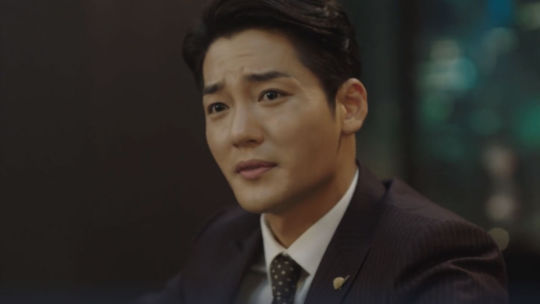
The Story: Blah blah blah, revenge or something- at a point it’s revealed that Mo Wan Joon is a trans woman.
Should you watch?: If you really like revenge melos maybe, but if you’re looking for this show to do something good and offer up some good trans rep? Nope.
Literally nothing about Mo Wan Joon’s story is watchable. I wasn’t even entirely sure the show even knows what being transgender even means. It comes off as more of a plot twist to put the family all in a tizzy more than anything else. They don’t really show much of Wan Joon’s struggle or anything poignant or engaging.
TharnType

TRIGGER WARNING: Sexual assault/rape
Country: Thailand
Official Links: https://www.facebook.com/notes/line-tv/tharntypetheseries-line-tvs-official-links-for-international-fans/2525229217761969/
The Story: Type is a homophobe who ends being roommates with the openly gay Tharn.
Should you watch?: No. The good you get isn’t worth sitting through the bad. But if you really can’t help yourself, you’ll have to learn to ignore its problematic elements.
Type was molested as a child, and as a result he hates gay people. He’s clearly still traumatized by his experience. He has nightmares and is triggered by Tharn at least once remembering his assault. Type eventually tells Tharn about his assault and it’s pretty much never brought up again.
Type is shown to be ridiculously homophobic and he equates gay people with pedophiles and is never really corrected in this logic (even though his boyfriend is a whole gay man). Even after Type starts dating Tharn, Type’s homophobia is never really properly put to rest.
For some reason, the writer of TharnType loves incorporating rape/sexual assault into her shows when it’s clearly a sensitive topic she knows next to nothing about. And it’s clear in this show, because the show take the topic way lighter than it should. Because of what happened to Type in his childhood, he believes that gay men like forcing themselves onto others without their consent, and then the show proceeds to have Tharn do exactly that to Type multiple times. Also, thankfully, this happens offscreen, but another character pays several men to gang rape another character and that’s too heavy for a show that clearly wasn’t going to address it properly.
At the beginning of this show, Tharn had a huge issue with knowing what boundaries and consent were, but by the second half, Tharn chilled out and Type stepped up and became ridiculously childish and violent towards Tharn. Clearly these two have no real business being in a relationship with each other if you ask me.
Though there was a lot I hated about this show I did like some of it. I think this writer writes some really nice and sweet scenes between Tharn and Type. Mew and Gulf have great chemistry. I’ve seen plenty of videos of Gulf and Mew together and they are adorable. They work well together and they come off more natural than some other couples, but the way the relationship is handled in TharnType and some of the things that are glossed over in this show leave a bad taste in my mouth.
The Mediocre (These aren’t the best, but they’re watchable.)
Moment at Eighteen: Jung Oh Je
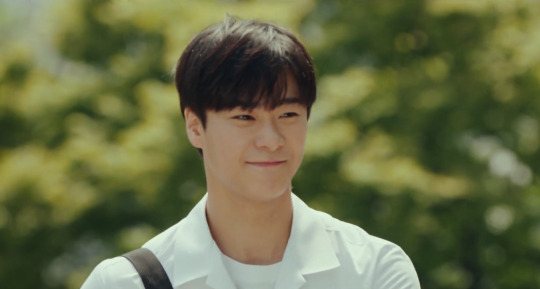
Country: Korea
Official Links: https://www.viki.com/tv/36633c-moment-of-eighteen?q=moment%20of
The Story: Transfer student Jun Woo has no interest in school life, as he is traumatized from being expelled from bullying. Meanwhile, Soo Bin has been watching Jun Woo all this time. She sees a different side to Jun Woo than the one that other people see. Oh Je, is Jun Woo’s best friend who starts to discover his sexuality.
Should you watch?: Hmmm… sure.
Oh Je has a decent side plot. It was interesting to see him figuring out he liked Hwi Young and coming out to his ex girlfried, Da Young and his friends. I do wish his story was expanded a little more though. There were several things I would have liked to have seen, like coming out to his family, and I thought they wrapped his story up a little too quickly at the end.
2moons2

Country: Thailand
Official Links: https://www.youtube.com/playlist?list=PLdoEouCtbBvjdNkB5Wl0eYS4V4Zx-1MZY
The Story: Wayo is accepted at the Kantaphat University, in the Faculty of Sciences. Wayo has always been in love with Phana, who studies at the same university. When Wayo has the chance to become the “moon” of his faculty, the two begin to spend time together because Phana himself has been the “moon” of the medical school the previous year and must supervise the freshmen participating in the competition. The two slowly get closer and closer.
Should you watch?: Yeah.
Honestly, it’s not super memorable,and not super impressive, but there’s some cute moments, and an easy storyline. We get to see more of the other two couples (MingKit and ForthBeam) than we saw in the original 2moons. It’s fun and interesting enough. I’ll look forward to the next one.
Theory of Love
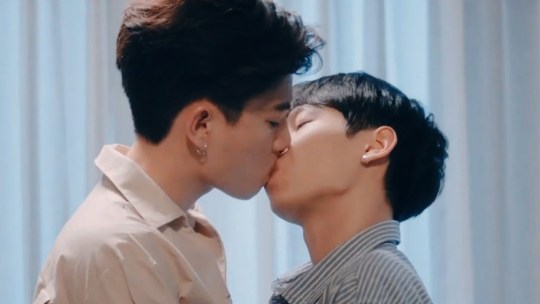
Country: Thailand
Official Links: https://www.youtube.com/playlist?list=PLVsizYwoQ6B3LsKmcDDMNtHGXnjG88i4C
The Story: Third is a filmology major and a member of the Savage Team along with his best friends Two, Bone, and Khai, but he has a secret. Third has been secretly in love with Khai for years.
For three years he has kept his secret love in his heart, silently supporting and loving Khai while knowing there is absolutely no future between them since Khai is as straight as a streetlight pole and also an absolute player.
To make matters worse, Khai has a “no dating friends” policy. How long can Third love Khai silently while watching Khai bring a different girl home every night? Third has tried to see Khai as just a friend. But has failed time and time again. Because as easy as it is to fall in love, to stop is just as hard. Maybe even harder. But when Third finally decides to stop loving Khai, Khai decides to start loving Third.
Should you watch?: It wasn’t my cup of tea but, yeah.
Who knew one of my most anticipated shows of the year would turn out to be one of the most disappointing? The show spent way too much time on Third crying, wallowing, and letting his friend walk all over him, and not nearly enough time on Khai making a believable turnaround. Khai spent at least half the show being a dick of a friend, to the point that I was unsure as to why Third liked him for so long. Then when Khai started to have feelings for Third, I just thought it happened way too quickly and unbelievably to me. But despite all that there were some cute moments in the end that made all of that kind of okay and kind of worth it. And the side couple was cute.
Dark Blue Kiss

Country: Thailand
Official Links: https://www.youtube.com/playlist?list=PLdoEouCtbBviEVFNHbg7dKw7Lfd8-6zB1
The Story: Kao and Pete being in a blissful romance, have grown closer. But Kao is closeted, and he fears the thought of others finding out. His mother introduces Non, a son of a colleague, to be tutored by Kao. With Non constantly giving off ‘iffy’ vibes towards Kao, it only fuels Pete’s jealousy. Their relationship is put in strain, but through this, they must ultimately overcome each other’s flaws.
Whilst Sun pushes his brother Rain to stay away from Mork, the younger man’s uncontrollable behavior brings him in. As his wildness is intriguing, Sun’s seriousness holds Mork down somewhat. Underneath it all, the two start to care for each other. However, with Mork’s dangerous life, he can’t shake who he is. But maybe he can for someone like Sun.
Should you watch?: If you’re a fan of Pete/Kao or a fan of the typical GMM show.
I wasn’t a huge fan of Pete and Kao from the series they were originally in and this show honestly didn’t really help. Pete and Kao’s relationship is pulled into an annoying direction when an outsider tries to come between the two of them. It’s classic bl tactics and frankly it’s boring and frustrating to watch when it drags on for multiple episodes. I did love Sun and Mork from the beginning, but even the writing for their storyline got annoying towards the end. The huge problem in this series is that none of our leads really communicate with each other. There’s some enjoyable things in this show but it’s ultimately more frustrating than it should be.
Ossan’s Love: In The Sky
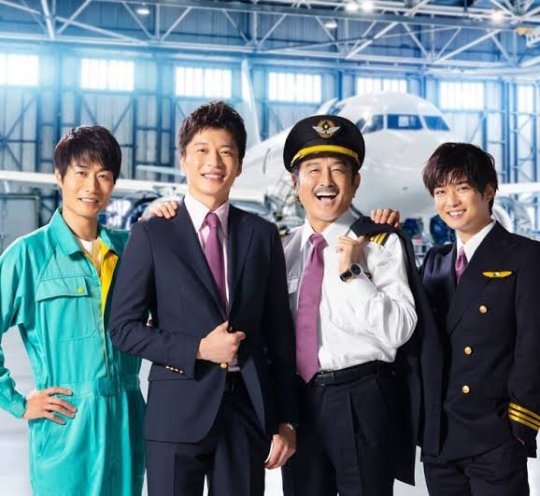
Country: Japan
The Story: Haruta, a 35-year-old single man, has to switch careers and he begins a new career as a cabin attendant in Tenku Peach Airlines. Even though he’s clumsy, he seems to be protected by the Great Captain Kurosawa. One day, he finds drawings of himself in a locker and accidentally discovers tries to figure out who drew them. Haruta discovers that not only is the mechanic Shino in love with him, but Captain is secretly in love with him too. Meanwhile, Haruta takes an interest in the co-pilot Naruse.
Should you watch? Yes, but you might be disappointed by the end.
I’m a fan of the original Ossan’s Love and I know what this show usually gives so I expected this show to be silly, ridiculous, fun. And it was for the most part. I always love Haruta. I would literally watch him in any reincarnation of this show and not complain. He’s always a joy to watch and that’s still true here. But this time around, things are a lot more messier than usual. There’s a complicated love triangle, which I hate, but even that was fine because I enjoyed the other characters. My only complaint was how it ended, because I would have preferred him with someone else rather than who he ends up with.
Love with Flaws: Won Suk and Ho Dol

Country: Korea
The Story: Joo Seo Yeon, is a hot-tempered physical education high school teacher who always wears sneakers, jeans and training uniforms. The death of her parents helped instill a deep sense of compassion, a generous heart and an outspoken objection for anyone who drinks and drives. Living in a house with three wild and very attractive brothers, she loathes flower boys. Her ideal type is someone who is “not handsome.” Won Suk is one of her handsome older brothers.
Won Suk has closed his heart to relationships and love, but he lives his life as an openly gay man. Ho Dol is closeted and lacks confidence. They meet one night at Won Suk’s bar.
Should you watch?: People have been kind enough to condense Won Suk’s and Ho Dol’s story into parts on YouTube so yeah, go ahead and check it out.
These two don’t get a whole lot of screen time, but the little they do get is nice. We get to see Won Seok help Ho Dol open up and be more confident with who he is and in turn, Won Seok opens up his heart.
The Good (These are worth the hours of your life you won’t get back.)
History3: Trapped

Country: Taiwan
Official Links: https://www.viki.com/tv/36410c-history-3-trapped?locale=en
The Story: Shao Fei’s police officer mentor and Tang Yi’s gang leader father were killed in a gunshot attack. No one knows why or what really happened. The only survivor, Tang Yi, stepped up and is now the gang leader. Police officer Shao Fei wants to find out what happened that day and he’s sure that Tang Yi’s hiding the truth. Shao Fei decides that the only way to figure out the truth is to investigate Tang Yi to the fullest and Tang Yi just wants Shao Fei to leave him alone since he’s trying to take the gang in a more legitimate direction, but what happens when the two keep crossing paths and ultimately start to fall for each other?
Should you watch?: Absolutely.
I watched this show twice last year and somehow I liked it even better the second time around. The story is fresh-school/university plots get real old real fast (not that I don’t love them though). Instead we get a story about a mob boss and a police officer. The plot is well written, coherent, interesting, and fun, and doesn’t revolve solely around the romance. And speaking of romance, it’s well integrated into the larger plot that focuses on figuring out what happened to Tang Yi’s father and Shao Fei’s mentor years ago. There’s just the right balance between plot and romance. There’s also a second couple that’s super cute. Both couples have great chemistry. What’s not to like?
He’s Coming To Me
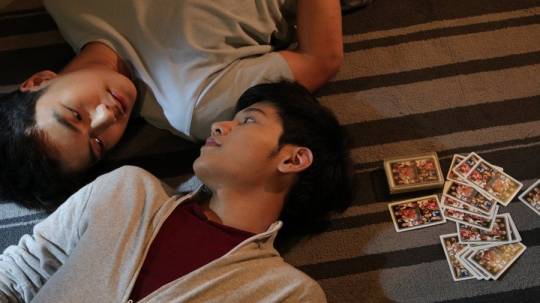
Country: Thailand
The Story: After his death, Mes is a ghost that is consumed by loneliness. That is until he meets a strange boy that can see him. The two bond in a state of happiness and joy as they develop into friends. But what happens when Mes falls for the boy who is alive?
Should you watch?: Of course!
This is by far, in my opinion one of the most slept on shows of 2019. Who would have thought things could work out between a ghost and human? I went into this show expecting it to be full of sadness and angst and it really surprised me. Of course it does have those things, Mes is ghost so… but it’s definitely one of the sweetest dramas of the year. The boys forge a strong friendship and bond from the beginning, they’re ridiculously cute, the side characters are enjoyable, the friends are supportive, and there’s an interesting story of Mes and Thun trying to figure out the mystery behind Mes’ death. You should definitely put it on your list to check out.
What Did You Eat Yesterday?

Country: Japan
The Story: Kakei Shiro is a 45 year old lawyer who works at a small law firm. He is a good cook and a meticulous and thrifty person who keeps the monthly food budget to 25,000 yen. Shiro’s daily routine is to leave work on time and head to a discount supermarket nearby. His partner Yabuki Kenji is an affable hairdresser in his 40s. The two of them share a two-bedroom apartment and the finer points of two men living together comes up at the dining table every day. Although two of them have been in a relationship for three years and Kakei’s parents know he is gay, Kakei never shares the fact that he is gay or Kenji is his partner to anyone else.
Should you watch? Definitely.
Very slice of life, very sweet, very heartwarming. We get to see two older gay men navigate their lives and society. We see how Shiro struggles with coming out and being open and we see how he deals with his accepting but ignorant parents. We see Kenji struggle with Shiro’s closed-offness and the strain its puts on their relationship when Shiro refuses to let people know they’re together. Shiro and Kenji interact with other gay couples too, and it’s interesting to see the dynamics between the different couples. It’s a nice change of pace to the shows I’m used to. Also, there’s plenty of food to salivate over.
Hello? Spring Is Coming

Country: Korea
Official Link: https://www.youtube.com/watch?v=lnyivXs1rWk
The Story: Every coming out is difficult, but most of all, coming out in front of family is the hardest.
Should you watch?: We get way too few shows about wlw. And also they’re way too short, and on that note yes you should watch. It’s sweet.
The Effect
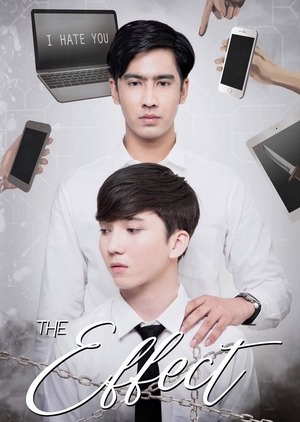
TRIGGER WARNING: Rape, bullying, attempted suicide
Country: Thailand
Official Links (in the comments): https://mydramalist.com/32424-the-effect
The Story: Shin, a shy and reserved 1st-year university student, admires his senior Keng from afar. Keng is tall, handsome, smart and owns the heart of many girls on campus. But what others don’t see is the pressure to be perfect from his family that weighs on Keng’s shoulders. Due to Shin’s clumsiness, he becomes acquainted with the handsome senior. As Keng takes a liking to his junior, jealousy from peers makes the cyber world a breeding ground for hate and nasty rumors. Shin falls victim not only to the strangers online but to Keng as well. Nobody but Shin can overcome the trauma that will be placed upon him. All he needs is for the strangers to listen. Because only then can they understand “the effect” that they have on others.
Should you watch? Heed the trigger warnings, and if you can handle them, then yes.
You know those BL shows where one of the characters is forced or coerced into having sex with their love interest and then falls in love with him at the end? This show is thankfully, not that. I wouldn’t even consider this a BL because, well because it’s not. It’s not a love story. It takes a very very different and serious path that most shows in this genre don’t even come close to. This show did a good job of really showing the effects of social media, bullying, and rape, what they could really do to a person, and the support system one needs after a trauma. At a (way too) short 3 episodes, it was super emotional, mostly realistic, and it really left a memorable impression. There were a few things I wish had been explored and fleshed out more and I wished they’d changed the ending from the novel. I would have preferred something more uplifting, less open ended potential tragedy. But on another note, James as Shin was a stand out here with such an emotionally draining role. I’ll definitely be looking forward to his future projects.
Mood Indigo/Indigo No Kibun
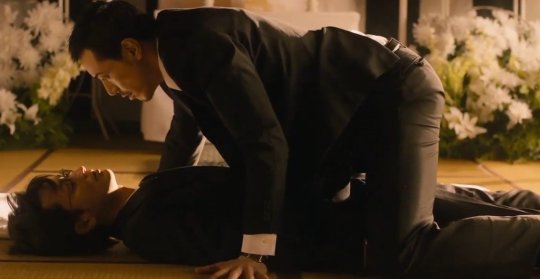
Country: Japan
The Story: The story begins with Shiro Kido’s reunion with a former classmate, Rio Kijima, at a college teacher’s funeral. In the past, when they were students, Kijima used to show talent as a novelist, even earning a big prize. Kido was jealous of Kijima’s success, but after reading his works he became aware of his lack of talent and gave up writing novels and became an editor of erotic novels. However, after reuniting, it became clear to Kido that Kijima was stuck; facing a wall. He had used up all his talent. With Kido also being in a lost state he offers Kijima the opportunity to write pornographic novels.With the intense eroticism and closeness, both men open up and feed into their desire.
Should you watch?: Yeah.
As one of the more erotic shows on this list, It was interesting to see the development between Rio and Kido. Their dynamic certainly isn’t anything romantic,cute, or healthy but still very beautiful, passionate, and raw. I wasn’t a huge fan of this shows predecessor Pornographer, but this one really made me appreciate it from another perspective. It helped me realize why Rio was the way he was and how this relationship impacted his later relationship with Kusami.
Really Lily?
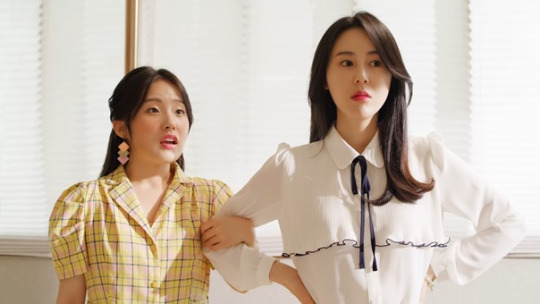
Country: Korea
Official Link: https://www.youtube.com/watch?v=167D6kmuspU
The Story: Are we friends? Or…
Should you watch?: It’s short, sweet, and funny. Absolutely.
Rural Outcasts

Country: Korea
The Story: Sun Hui moves to a small village where she lives her life as Soon Ho until she can make enough money to become her true self. Dong Ja, a feisty 12 year old, breaks into her house one day.
Should you watch? Yes.
Found family always makes for a heartwarming story and this one is no different. I loved the bond between Dong Ja and Sun Hui and I loved their mother daughter relationship. Very sweet and heartwarming, but be prepared for some heartbreak too.
History3: Make Our Days Count
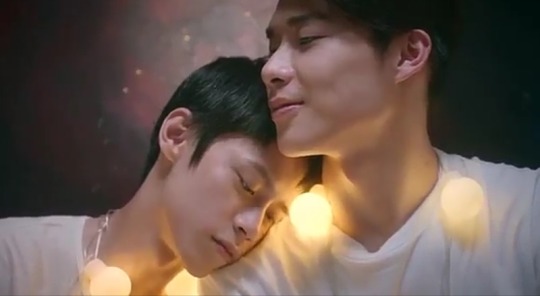
TRIGGER WARNING: Forced kisses, bullying
Country: Taiwan
The Story: At first glance, high schoolers Xiang Hao Ting and Yu Xi Gu appear to be polar opposites: While Hao Ting is an outgoing, hot-headed extravert and some-time bully, Xi Gu prefers to keep a low profile and focus on his schoolwork. They seem bound for totally different futures – the bookish Xi Gu looks destined for academic success, while life is just a long popularity contest for Hao Ting. But a quirk of fate – and a crucial intervention by a female schoolmate – results in the two young men’s paths crossing. But there is more to both young men than first meets the eye. Hao Ting was not always this way. He started out as a perfect student until he discovered the joys of going off the rails. Xi Gu has a reason for being so aloof and studious: His parents died in a traffic accident while he was younger, and he is being fostered by his aunt. As such, he works hard to get good grades in an effort to win a scholarship and ease the financial burden on his relatives. Xi Gu and Hao Ting find themselves drawn together, and passions ignite. The former notices that he has the unique ability to bring Xi Gu out of his shell – and becomes intent on melting his cold-as-ice exterior. What will happen when their two worlds collide? And can love be the catalyst that helps bring these two unlikely students together – as their high school days draw to a close?
Sun Bo Xiang is Hao Ting’s friend who has a crush on a man, Lu Zhi Gang who he meets at the gym. Zhi Gang’s runs the shop that Xi Gu works at part time. When Bo Xiang confesses to Zhi Gang, and tells him that he’ll love hm forever, Zhi Gang doesn’t believe it because Zhi Gang is young and overzealous. Also, nothing lasts forever, or does it?
Should You Watch?: Yes, but it doesn’t end happily so keep that in mind..
Given this show’s predecessors it had some big shoes to fill. I expected this show to be good and honestly, it was. The general consensus is that the ending ruined the entire show. And had I had time to sit on this series-if I had watched it over the weeks, I might have felt the same way. But I watched the entire show in one sitting over the course of a day and I just can’t bring myself to hate it completely. The writing was good, the directing was good, and the acting was so good I think a lot of the show was elevated because of it. This show made me feel so many things. The couples are great with natural chemistry, and the side characters fit so well (there’s never a dull moment with Hao Ting’s friends). I smiled, I laughed, and of course I cried (#heartbroken). I was sad and upset when episode 10 came around. I wasn’t disappointed once the credits rolled because I was still riding the emotional high of the first nine episodes, but after I had time to sit and think about it, the more disappointed and angry I got. Just like grey rainbow and wise prison life- why did you give me everything I ever wanted and then rip it out from under me? But even so, the first nine eps were great. Does it have its flaws? Well obviously, some things in the show are a little iffy (Hao Ting and Sun Bo practice some problematic behavior at the beginning towards their love interests, that’s where the trigger warning comes in) and the last episode is a glaring misstep. Do I wish things had ended differently? I think they absolutely should have. Even this ending would have been satisfactory with some proper execution and build up. Overall this show could have cemented itself as one of my favorite shows if not for the last episode, but I really don’t regret watching it, because when it was good? It was gold.
Out of Breath

Country: Taiwan
Official Links: https://www.youtube.com/playlist?list=PLuUQH5CiOw6n9Z0O5ytuQY2EFuvbF_7DX
The Story: Ha Eun has just broken up with her girlfriend when she meets out and proud Min Seo.
Should you watch?: Yes!
It’s a short webseries about coming out and no longer wanting to hide who you are. It’s very sweet and realistic. The ladies are cute and their characters are believable. My only complaint is that I wish the show was longer.
Until We Meet Again

TRIGGER WARNING: Suicide
Country: Thailand
Official Links: https://www.youtube.com/channel/UCPXE51seODgcGxLQF_X5jzQ/playlists
The Story: Thirty years ago, Korn and Intouch were university students in Bangkok. Intouch entered Korn’s life despite knowing that he was the son of one of the most influential people in Bangkok, the mafia. At first, Korn kept pushing Intouch away, but in the end, he couldn’t resist him. However, in a time where homosexuality was unacceptable and having parents that were against their relationship and each other, Korn and In’s love was bound to be doomed. Amidst the chaos, while Intouch kept on fighting for their future, Korn could not deal with all the suffering his lover was facing and decided to give up. That day, two sounds of a gunshot rang through the air. Their story ended with tragedy, but something had already tied itself between them, bounding them together even after they were dead.
Years later, a freshly returned to Thailand, Pharm who is a freshman in T- University has grown up always feeling like he is waiting for someone. Being riddled with sad dreams that always left him waking up with a wet face, fear of loud noises, and a birthmark on his temple, the boy has always felt like there is someone he is missing. Dean, the third year swimming club’s president at T- University has also spent his life searching for someone whose face he can not remember. The red thread of fate that had tied them together in their past life once again pulls the two boys back to each other, tying them to each other and a past that might not be worth remembering, but a love that is unforgettable. Because the red thread that binds the two hearts together will always lead one back to the other. Even though it might tangle or stretch, it will never break.
Should you watch?: 100% yes.
This show isn’t finished yet, so I’ll just talk about what I’ve seen up to this point. I read a few comments about this show before I watched it and although it was one of the shows I was looking forward to the most, I was skeptical about watching it since the reviews were mixed. Lots of people love it, but there was also an overwhelming about of people saying it was boring and average at best. After watching the 12 episodes that are out, I gotta admit that it’s not perfect. It is a little slow in some parts, some times you feel like you’re watching Thailand’s version of the food network, the director needs to learn when a scene is over, the product placement can be distracting, the kisses are more awkward than I’d like them to be, and that sounds like a lot to be bothered by, but honestly- I love this show. I feel like Until We Meet Again is what happens when a production crew cares more about making a good show rather than making something that fuels the typical bl fan’s fantasies. It has an interesting storyline and it’s well acted. There’s great emotional moments filled with sweetness and sadness. It’s funny and there’s loving and supportive family and friends. A lot of the typical bl drama tropes aren’t involved here. There’s no girlfriends, no portrayals of women as evil incarnate, no cheating, no coercion into sexual activities, or the popular I’m just gay for you crap. I saw on Twitter a while back that someone was asking how they could get bl to branch out-how to reach a larger audience because there’s a lot of people that won’t watch it-this is how you do it.
#until we meet again#history3#make our days count#trapped#hes coming to me#what did you eat yesterday#out of breath#the effect#rural outcasts#really lily#hello spring is coming#mood indigo#indigo no kibun#love with flaws#ossans love in the sky#theory of love#2moons2#moment at eighteen#tharntype#graceful family#lgbtq#kdrama#thai drama#taiwanese drama
24 notes
·
View notes
Text
I love watching the Golden Globes but
goddamn there is absolutely NO reason why there shouldn’t have been more female nominees this year. Greta Gerwig created the masterpiece that is Little Women. Awkwafina might have won Best Actress for The Farewell which is a total win but the female director (Lulu Wang) didn’t get a nomination either. Yes, a lot of iconic directors made iconic movies this year, but I’ll tell you what, I’ve never seen so many MEN in the nominees for best picture in my life. All of the little clips from each nominee are ALL MEN. I swear to god the only women I saw were ScarJo in Marriage Story and Laura Dern from Marriage Story. Once Upon a Time had Margot Robbie for Sharon Tate but she wasn’t even in the movie THAT much? Women made killer movies this year that showed the good, bad, and the ugly of both men AND women. Booksmart was probably my favorite movie of the year because the protagonists were feminist women, one was openly gay and that wasn’t her only characteristic, so many stereotypes were broken, it had wonderful male AND female characters and arcs, and it was directed by Olivia Wilde! The only award Booksmart was nominated for was Beanie Feldstein for Best Actress and it deserved so much more praise. Greta Gerwig made the movie Little Women, which is such a feminist movie because it shows the infamous side of female protagonists that detests the expectation of marriage but also has one of the most openly feminist actors Emma Watson playing a woman who is feminist who chooses to be a wife and chooses to be a homemaker and a mother while still yearning for the more fancy things in life. Like her character says to the carefree Jo, “Just because my dreams are different than yours doesn’t mean they’re unimportant.” THAT movie didn’t get nominated for anything except score and the beautiful performance by Saoirse Ronan. HOW??
I didn’t mean for this to turn into a big rant, but here I go I guess—2019, while it’s been one of the most incredible years for film, with movies like Jojo Rabbit that show the undeniable truth about the lies and propaganda and brainwashing that took place in Nazi youth and how it’s reappearing in our society today, The Lighthouse, which is visually breathtaking, chilling, and performed wonderfully by its two leads, Rocketman, showing the incredible story of one of the most amazing icons of music Elton John, and the funny, amazing new take on the Whodunnit mystery, Knives Out, whose main lead is a Latina woman who is the daughter of immigrants and steals the show and our hearts, we still can’t overlook some of the real tragedies of our films this year. I’ve watched some of the best movies of my life this year, some who have been unquestionably diverse and accepting and that have BROKEN boundaries, but I’ve also seen movies that have made me lose some hope.
I think the real tragedy is that we have expected too much from the people in the companies who produce the biggest movies that are pumped into our commercials and the only movies that are shown in our mainstream theaters and the ones that are advertised the most—the ones who say that we’ll get more representation and then are dwindled down to background characters with little to no importance or don’t even have names! I was betrayed by big movie production companies this year. I was promised “representation” by The Russo Brothers on Avengers Endgame and I got a scene with one of the brothers playing a man who had lost his male partner in the snap and trying to recover. This man doesn’t have a name, he is just referred to as “the grieving gay man.” He appears for one scene and that’s it—that’s our “representation.” I was promised “representation” in Star Wars: The Rise of Skywalker and received a brief kiss between two members of the Resistance who I could only recognize one of and I don’t believe the other really had a name. It was in the background, between two people who were not important characters even though two of the main characters in the trilogy had chemistry, backing by both the actors and the community, and most of their scenes together, but was straight washed by the directors because Disney wouldn’t allow it. Poe and Finn were given female romantic interests, Poe is openly unenthused about holding Finn’s hand for a scene, and Poe even asks to kiss his love interest who he obviously has had a history with.
I understand that even the slightest bit of representation is great in huge blockbusters like these, but maybe this is just me but I don’t understand how movies like Avengers Endgame and Star Wars—with massive fan bases and dedicated fans, can just sideline diversity in favor of more money? Like people are going to watch the last Star Wars no matter what! And I don’t give a shit how much backlash you get from some of those crazy Star Wars fans—they can suck it up and stop being homophobic. Besides, I’m tired of having to explain to my family that just because we get a little representation that means I can’t expect more. I don’t feel represented when major companies can’t even bother to make one of the main characters anything other than cis or straight.
They can’t even handle having an Asian woman being in a main role—God, don’t even get me started on what they did to Kelly Marie Tran—she did not deserve the treatment she got and having it called “technical difficulties” in the new Star Wars, we all know they were just trying to please the hateful terrible fans that ruin the Star Wars magic for me sometimes.
Having representation is not doing just the “bare minimum.” Having representation is creating CHARACTERS with names and stories and importance to show that these people are just as important as everyone else and that they CAN be the leads and not just BACKGROUND characters. That there are GAYS in Star Wars and there are GAY SUPERHEROS. Having representation is NOT a scene that you can cut out to make more money from homophobic countries! People are LGBTQ+ and they go to watch movies and find themselves in characters and being apart of that community and seeing gay characters shoved to the side to try to get the “representation” in while also not risking losing any money is just heartbreaking.
Stop doing the bare minimum in 2020. Go big or go home. We need to show ALL people in our movies, because there are more than just white straight men in the world. I’m begging for more women—women of color, trans women, women of all shapes and sizes and ethnicities—ALL WOMEN. I’m begging for more LGBTQ+ characters. I’m begging for non-binary characters and they/them pronouns because THOSE PEOPLE EXIST and I don’t see it on the big screen ever. I want to see people around me and in this community being able to see themselves in film because it is one of the most important art mediums out there. Stop putting us to the side and start putting us front and center!
Ok I’m going to sleep now.
#madison’s super long rant#im sorry i just was really mad about the golden globes#greta gerwig deserves to be nomiated for every category#also shes dating noah baumbach?? what a power couple.#finn and poe deserved more.#more diversity in movies!!#no more bare minimum.#women deserve recognition for the incredible movies they made
3 notes
·
View notes
Text
I absolutely love Tyler Blackburn
New article today
He is such a gem ❤
So genuine. Deserves all the love and support!
You can tell how much Alex means to him.
Please don't destroy this amazing character or this wonderful ship Carina!
It's a long read but well worth it
https://www.playboy.com/read/down-to-earth
❤
Down to Earth With Tyler Blackburn
The star of the CW's 'Roswell' reboot isn't a poster child of anything but his own path
Written by Ryan Gajewski
Photography by Graham Dunn
Published onJune 11, 2019
I’ve never met Tyler Blackburn before—except that I have. Maybe it would be more accurate to say I’ve met versions of Tyler Blackburn. I’ve spent time with the actor on multiple occasions while covering his TV series Pretty Little Liars, the soapy teen-centered murder mystery that regularly generated more than a million tweets throughout its seven-season run. Just two weeks ago I reconnected with him in a lush meadow of flowering mustard outside Angeles National Forest, the site of his PLAYBOY photo shoot. But the Tyler Blackburn I’m meeting today at his home in the Atwater Village neighborhood of Los Angeles is in many ways an entirely different man.
When he greets me at the front door, Blackburn is relaxed, barefoot and still wearing what appears to be bed head. His disposition is unmistakably freer—lighter—than it’s been during our previous encounters. Perhaps I shouldn’t be surprised by this. Six days earlier the 32-year-old actor came out publicly as bisexual in an online interview with The Advocate. The announcement is clearly at the forefront of his mind as we sit down at his dining room table.
Almost immediately he starts to gush about the positive, and at times overwhelming, feedback he has received over the past few days. Within minutes he’s in tears. He tries to lighten the mood with a self-effacing quip, but now I’m in tears too. Then he tells me he can’t remember my question.
I haven’t even asked one yet, I reply.
“It just makes me feel, Wow, the world’s a little bit safer than I thought it was,” Blackburn says.
The most affecting response he’s received thus far has been from his father, whom Blackburn didn’t meet until he was five years old. Although he avoids offering any more details about that early chapter, he says, “Feeling like I’m a little bit different always made me wonder if he likes me, approves of me, loves me. He called, and it was just every single thing you would want to hear from your dad: ‘That was a bold move. I’m so proud of you.’ It was wild.”
Blackburn can’t pinpoint the exact moment he knew he was bisexual but says he was curious from the age of 16. It wasn’t until two years ago, though, that he decided to approach his publicity team about coming out publicly. At that point, Pretty Little Liarshad wrapped, and the actor was without a job. So Blackburn and his team agreed they needed to hold off on making an announcement until his career was stable again. The lack of resolution weighed on him.
“A year ago I was in a very bad place,” he says, adding that he has struggled with depression and anxiety. “I didn’t know what my career was going to be or where it was going. My personal life—my relationship with myself—was in a really bad place.”
His casting on the CW’s Roswell, New Mexico, adapted from the same Melinda Metz book series as the WB’s 1999 cult favorite Roswell, seems to have come at the right time. Blackburn portrays Alex, a gay Army veteran whose relationship with Michael, a bisexual alien, has attracted legions of “Malex” devotees since the show’s January debut. Roswell, New Mexico has already been renewed for a second season—a feat for any series in this era of streaming, let alone one involving gay exophilia.
Playing a character whose queerness has been so widely embraced by fans no doubt nudged Blackburn closer to revealing his truth for the first time since becoming an actor 15 years ago. (As he told The Advocate, “I’m so tired of caring so much. I just want to…feel okay with experiencing love and experiencing self-love.”) Still, he was somewhat reluctant. His hesitation was rooted in the fact that he wouldn’t be able to control what came next: the social pressures that often come with being one of the first—in his case, one of the first openly bisexual male actors to lead a prime-time television series.
“If you stand for this thing, and you say it publicly, there’s suddenly the expectation of ‘Now your job is this,’ ” he says. “Even if someone’s like, ‘Now you’re going to go be the spokesperson’—well, no. If I don’t want to, I don’t want to. And that doesn’t mean I’m a half-assed queer.”
Full disclosure: I previously wrote for a Pretty Little Liars fan site. In 2012 I published a listicle that ranked the show’s hottest male characters. Blackburn cracks up when I tell him this and wants to know whether he bested Ian Harding, his former co-star. After I inform him that his character (hacker with a heart of gold Caleb Rivers) finished second behind Harding’s (Ezra Fitz, a student-dating teacher) I promise to organize a recount. The always-modest Blackburn concedes that Harding is the rightful winner. (If anyone ever compiles a BuzzFeed article titled “Most Embarrassing Moments for Former Bloggers,” I’ll be offended if I’m not in the mix.)
Blackburn makes it clear that he has not always been comfortable with his status as a teen heartthrob. Knowing he was queer made it “hard to embrace it and enjoy it.” Growing up, he was bullied for being perceived as effeminate and was frequently subjected to slurs and homophobic jokes. He describes himself as a late bloomer who took longer than usual to shed his baby fat. He didn’t have many friends, nor did he date much in high school.
A lifelong fan of musical theater and the performing arts, Blackburn signed with a Hollywood management company at the age of 17. His team at the time warned him that projecting femininity would hinder his success. An especially painful moment came after he’d auditioned for a role as a soldier and the producers wrote back that Blackburn had seemed “a little gay.”
“Those two managers were so twisted in their advice to me,” Blackburn says. “They just said, ‘We don’t care if you are, but no one can know. You can’t walk into these rooms and seem gay. It’s not gonna work.’ I remember the shame, because I’ve been dealing with the feeling that I’m not a normal boy for my entire life.”
After landing a recurring role on Days of Our Lives in 2010, Blackburn scored his big break when he appeared midway through the first season of Pretty Little Liars. “I was in Tyler’s first scene, so I got to be one of the first to work with him,” Shay Mitchell, who starred opposite Blackburn, tells PLAYBOY. “Right away, I knew he was special. Since the day I met him, Tyler always struck me as very authentic and very true to himself.”
Fans instantly adored his on-screen love affair with Hanna Marin, played by Ashley Benson. The pair became known as “Haleb,” and Blackburn went on to win three Teen Choice Awards—surfboard trophies that solidify one’s status as a teen idol—in categories including Choice TV: Chemistry.
According to Blackburn, during the show’s seven years on the air, he and Benson bonded over their mutual distaste for the tabloid stardom that comes with headlining a TV phenomenon lapped up by teens. Today he fondly reflects on their on-camera chemistry. “It felt good,” he says. “It felt real.”
Of course, rumors swirled that the pair’s romance was actually quite real. “We never officially dated,” he tells me. “In navigating our relationship—as co-workers but also as friends—sometimes the lines blurred a little. We had periods when we felt more for each other, but ultimately we’re good buds. For the most part, those rumors made us laugh. But then sometimes we’d be like, ‘Did someone see us hugging the other night?’ She was a huge part of a huge change in my life, so I’ll always hold her dear.”
Blackburn also shares a unique connection with Mitchell outside their friendship. Similar to what Blackburn is now experiencing with Roswell, Mitchell was embraced by the LGBTQ community for playing a lesbian character, Emily Fields, whose same-sex romances on Pretty Little Liars were among the first on ABC Family (the former name of the Freeform network).
Over the years, Blackburn had come out to select members of the Pretty Little Liars cast and crew, including creator I. Marlene King. But as the show approached its swan song, he started to recognize how hiding a part of himself was negatively affecting his life. He entered his first serious relationship with a man while filming the show’s final season. Not knowing how to tell co-workers—or whether to, say, invite his boyfriend to an afterparty—caused him to “go into a little bit of a shell” on the set.
“My boyfriend was hanging out with me at a Pretty Little Liars convention, and some of the fans were like, ‘Are you Tyler’s brother?’ ” Blackburn says. “He was very patient, but then afterward he was like, ‘That kind of hurt me.’ It was a big part of why we didn’t work out, just because he was at a different place than I was. Unfortunately, we don’t really talk anymore, but if he reads this, I hope he knows that he helped me so much in so many ways.” At that, Blackburn tearfully excuses himself and takes a private moment to regain his composure.
“I never remember a time when I didn’t enjoy being with him,” says Harding, Blackburn’s former co-star. He says he saw the actor “start to become the person he is now when we worked together” but believes Blackburn needed to first come to terms with the idea that he could become “the face” of bisexuality. “Tyler’s discovering a way to bring real meaning with his presence in the world,” Harding says, “as an actor and as a whole human.”
Once the teenage Blackburn realized he was attracted to guys, he began “experimenting” with men while taking care not to become too emotionally attached. “I just didn’t feel I had the inner strength or the certainty that it was okay,” he says. It wasn’t until a decade later, at the age of 26, that he began to “actively embrace my bisexuality and start dating men, or at least open myself up to the idea.” He says he’s been in love with two women and had great relationships with both, but he “just knew that wasn’t the whole story.”
He was able to enjoy being single in his 20s in part because he wasn’t confident enough in his identity to commit to any one person in a relationship. “I had to really be patient with myself—and more so with men,” he says. “Certain things are much easier with women, just anatomically, and there’s a freedom in that.” He came out of that period with an appreciation for romance and intimacy. Sex without an emotional component, he discovered, didn’t have much appeal.
“As I got older, I realized good sex is when you really have something between the two of you,” says Blackburn, who’s now dating an “amazing” guy. “It’s not just a body. The more I’ve realized that, the more able I am to be settled in my sexuality. I’m freer in my sexuality now. I’m very sexual; it’s a beautiful aspect of life.”
Blackburn has, however, felt resistance from the LGBTQ community, particularly when bisexual women have questioned his orientation. “Once I decided to date men, I was like, Please just let me be gay and be okay with that, because it would be a lot fucking easier. At times, bisexuality feels like a big gray zone,” he says. (For example, Blackburn knows his sexuality may complicate how he becomes a father.) “I’ve had to check myself and say, I know how I felt when I was in love with women and when I slept with women. That was true and real. Don’t discredit that, because you’re feeding into what other people think about bisexuality.”
He clearly isn't the first rising star who's had to deal with outside opinions of how to handle his Hollywood coming-out. I spoke to Brianna Hildebrand just before the release of 2018's smash hit Deadpool 2, and she explained that she had previously met with publicists who had offered to keep her sexuality under wraps, even though the actress herself had never suggested this. Meanwhile, ahead of the launch of last fall's Fantastic Beasts sequel, Ezra Miller told methat he's "been in audition situations where sexuality was totally being leveraged."
Fortunately for Blackburn, his recent experiences with colleagues have largely been supportive ones. He came out to Roswell, New Mexico showrunner Carina Adly Mackenzie when he first arrived in N.M. to shoot the pilot but after he had earned the role of Alex, which for him was the ideal sequence. "I think he takes the responsibility of being queer in the public eye very seriously, and waiting to come out was just about waiting until he was ready to share a private matter—not about being dishonest to his fans," Mackenzie tells PLAYBOY. "I have always known how important Alex is to Tyler, and I know that Tyler trusts me to do right by him, ultimately, and that’s really special."
Blackburn finds it funny that he’s known for young-skewing TV shows; the question is, What might define him next? He’s grateful for his career, but he grew up wanting to make edgy dramas like the young Leonardo DiCaprio. He also cites an admiration for Miller, the queer actor who plays the Flash. “I most definitely want to be a fucking superhero one day,” Blackburn says a bit wistfully.
His path to cape wearing does look more tenable. The day before his Advocateinterview was posted, he booked a lead role in a fact-based disaster-survival film opposite Josh Duhamel. Blackburn jokes that his movie career was previously nonexistent, though his résumé features such thoughtful indie fare as 2017’s vignette-driven Hello Again. There, he plays a love interest to T.R. Knight, who tells PLAYBOY that Blackburn “embraces the challenge to stretch and not choose the easy path.”
For now, Blackburn’s path appears to be just where he needs it to be. “I may never want to be a spokesperson in a huge way, but honestly, being truthful and authentic sets a great example,” he says. “To continue on a path of fulfillment and happiness is going to make people feel like they too can have that and it doesn’t need to be some spectacle.” As it turns out, he may already be a superhero.
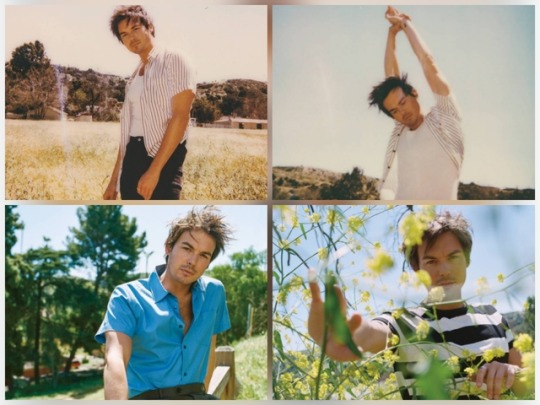
#tyler blackburn#roswell cast#roswell nm#alex manes#roswell new mexico#malex#roswell alex and michael
16 notes
·
View notes
Note
3, 8, 9, 14, 15
3. is your family accepting?- ummm… my mother is, and my grandmother kinda is ? my one aunt + uncle are very homophobic / transphobic etc etc, and the other .. idk tbh, like theyve said some transphobic things but my uncles wifes late brother was openly gay so its like . complicated
8. when did you find out your sexuality?- duuude i figured something was up when i was like 13
9. how was your day?- not great, im sick + my mental health is deteriorating again. im in for a wild ride
14. are you openly out?- pretty much! i havent actively told some family members abt it yet but i used to be very obvious w the things i posted on fb. still had my profile set to ‘interested in men and women’ so if they know they know if they dont i dont rly care
15. are you comfortable with yourself?- ive only started feeling comfortable w myself a couple of months ago.. idk anyone in their teens who is comfortable w themselves and if there are any then wow !! i wish that were me. but now that ive left my teens things have been put into perspective ig and im ok w myself
2 notes
·
View notes
Note
if by free, you mean the women were forced to follow a standard set by the "masculine" men (LOL) and if by more respectful, you mean more racist and homophobic. sure.
I knew this ask would come, so I put the word in inverted commas, it seems it didn’t work. I must tell something before I start: I am NOT homophobic, I am NOT a racist and I do NOT have any intention to hurt anyone. By the word ‘masculine’ I meant more polite, respectful to women and ‘a true gentleman’. People were nicer back then, now there are men harassing women so openly and that is definitely not ‘masculine’. A man demonstrating his ‘ego’ like a peacock displaying its feathers is not ‘masculine’. A man asking a woman again, again, and again is not ‘masculine’. A man who thinks he can do anything because oh, he’s a man, is not ‘masculine’. And now you’re going to ask me these kind of men always existed. Yes, hell yes. But now the things going wild than ever! Some people just need to understand that, and because of these men there are women who are in bad situation and can’t speak a word because they are afraid of raising their voice. I was streaming the news today and I saw an article, saying the rapist got unpunished. What the… hell! Women harassed by men must speak up because that’s how we actually solve the problem! There are families who marry their six year old daughter even is she doesn’t want to! I mean, six… She should be playing with her toys not betrothed! There are people who hit their wife and think they can do this because it’s their right! Please, please don’t come to me with these kind of asks because I just can’t… I’m too angry.
4 notes
·
View notes
Text
Chapter Eighteen : LE MARIAGE POUR TOUS

Part Two of the extensively-researched and exhausting journey through France and its Queer citizens through time. As we explored France’s Past with Queer History yesterday, Today is about that very special time of 2012–2013 with the passing of Same-Sex Marriage. Tomorrow, our present and future. In this article, we’ll explore how we came to same-sex marriage, the opposition, the climate of the time and how much of a cunt you are if you ever thought “yeah, now we have same sex marriage, we can chill”.
As most of you must know by now, Same-sex marriage has been legal in France since May 18, 2013. It became the thirteenth country worldwide to allow same-sex couples to marry (out of 28 as of 2019). Unfortunately, even in a country that promotes itself as gay-friendly, it wasn’t an easy fight. And here are the highlights.

With the implementation of the PACS in 1999, the country was somewhat at peace with LGBTQ+ rights. It didn’t last long though. On June 5, 2004, Mayor of Bègles and former Green Party Presidential Candidate Noël Mamère conducted a same-sex marriage ceremony for two men. The Minister of Justice later declared the union null and void. The case went up to the Court of Cassation and the European Court of Human Rights, to zero positive results and Mamère was suspended from his functions.
In 2006, as the PACS was getting more and more rights, a committee on the “Report of the Family and the Rights of Children” argued that marriage, adoption and medically assisted reproduction for same-sex couples were still out of the question.
Flashforward to 2011. While the government was no longer trying to give more rights to LGBTQ+ people (it should be noted that only the L and G were in the public’s mind. Maybe a little L but with even less consideration), LGBT organizations decided to go the Constitutional Council and ask a review of same-sex marriage as unconstitutional. The demand was rejected and the question was send to the Parliament. On June 14th, the Assembly voted 293–222 NO to same-sex marriage. Socialists deputies were “mostly” in favor of the law and just like that, as gay rights were a major player in the 1981 presidential election, the same happened with the 2012 legislative AND presidential campaigns.
2012 AND ITS PROMISES

Power-thirsty candidate François Hollande announced during his presidential campaign his support for same-sex marriage and adoption for same-sex couples. To be fair, Hollande was already a vocal supporter of those rights back in 2004, while his partner at the time, Ségolène Royal, was less into it. Queer people had their cheerleader and, no spoilers here, Hollande won the election on May 6th, 2012. With a absolute majority at the Assembly a few weeks later came a promise of a bill no later than spring of 2013. The first draft was submitted to Parliament on November 7, 2012. And that’s when…
BIGGOT’S SHIT HIT THE FAN
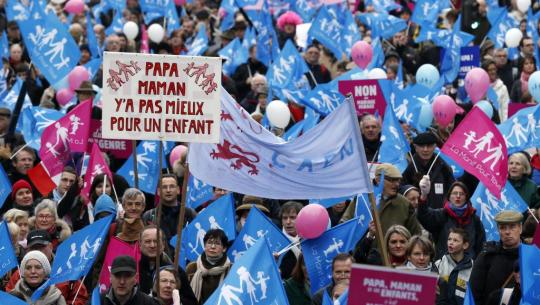
November 17th, 2012 saw the creation a collective called “La Manif’ Pour Tous” (or MPF) as a response to the new government’s plea for same-sex marriage. Made mostly of faith-based associations (37 to be exact), it was founded by Frigide Barjot, Ludivine de la Rochère and Albéric Dumont. Yep, if you feel the need to thank anyone for feeling like a piece of shit back in 2013, those three seem like the main recipients.
I was going to do a portrait of Frigide Bardot but on second thoughts, she’s so not worth it. The self-proclaimed “press manager of Jesus” also created the ‘Collectif de l’Humanité Durable” which campaigns against abortion and euthanasia rights. Her quotes are as intelligent as “Same-sex marriages are like weddings between animals” and she’s a ridiculous person.

So, back to MPF. Did you know that of those 37 organizations, Le Monde found out that 22 of them did not exist or were just “empty shells” associations ? Hmm. Funny, right ? Anyway, on November 17th, the first manifestation is organized. Around 70,000 people took to the street with slogans like “La Famille, Patrimoine de l’Humain”, “Un Papa, un Maman, on ne ment pas aux enfants” or “Le Gender, c’est pas mon Genre”. What a bunch of clever little Jesus Freaks.
A second manifestation is put together on January 13th, 2013. This time, sources talk to close to 340,000 people all around Paris. Marine LePen was there, all smiling and happy. CUNT. A month later, 700,000 signatures were on a petition sent to the Conseil Economique, Social et Environnemental (CESE). The demands of the Manif pour Tous were rejected by the Tribunal Administratif of Paris, which dimmed it invalid, the Cour d’Appel of Paris and finally the Conseil d’Etat.
Third manifestation on March 24th. 300,000 people attended while the Right Party (UMP) joined the march.
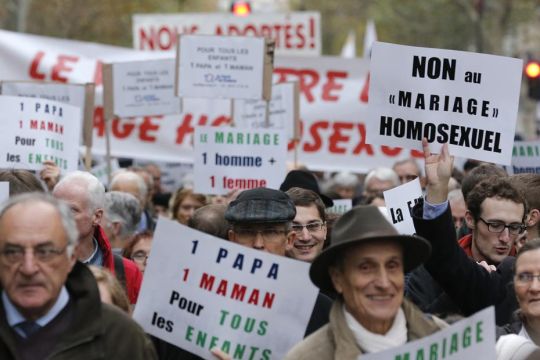
On the fourth manifestation on April 21st, only 45,000 people were present, showing a slowing down of the bigoted movement. The Manif Pour Tous was tearing itself apart from the inside, with Frigite Bardot becoming a too crazy-and-permanent presence in the media and a few important organizations leaving the show, like Printemps Français.
Did you know that the Manif pour Tous was still active and is now a political party ? More on that tomorrow.

Nothing about that was funny. More than dramatic, it was a scary time for Queer People as La Manif pour Tous instigated a new rule to the game of life.
THE RIGHT TO HATE
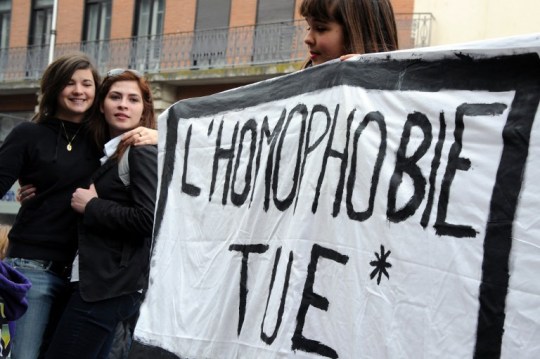
It became apparent in 2013 that parts of the country was liberating themselves from its political correctness that came with the Aids Epidemic et the arrival of the PACS. A report from May 2014 announced a 78% gain in homophobic slurs and attacks in 2013. In total, 3500 cases were reported to the police at some point during the year. A third of those cases were linked to the Manif pour Tous. The media saturation on the subject made it an everyday debate from Monday to Sunday, from the workplace to the dinner table. A Queer person was being attacked every two days, mostly in public places.
Quote from the report “victims consider that the exposure to aggressive rhetorics gave the attackers a sense of encouragement, a feeling of doing the right thing, and favorable impunity when it came to act”. Queer people were forced back in the closet in some way, as just holding your partner’s hand or kissing in public could land you in the hospital.

Example : A lesbian couple in Lyon cuddled on the subway. A young homophobe saw that, called them “disgusting lesbians, whores, sluts, bitches” and hit them both. Example : On April 7th, 2013, the very public bashing of Wildred de Brujin while he was walking with his boyfriend in the streets of Paris (see article “Queer Community vs Violence”). Example : I COULD DO THIS ALL DAY. I, myself, was punched in the face in my car while surrounded by a group of thugs who didn’t like the fact that two guys were in a car talking in their neighborhood. They asked us “What are you doing here?”. We’re talking, what does it look like ? They said “We don’t want people like you around here, fuck off”. What people ? People who talk ? My window was open just enough for one of them to put his fist in my face. I turned the engine on, open the door wild to push them away and ran away. My friend was living on that street and we had to wait at least half an hour before coming back and letting him go home. I was furious. I kept on driving, my hands were shaking. I stopped the car twice. The first time, to calm myself down as I was about to faint from anger. The second time, I leaned over to my friend — who was just a friend — and kissed him for a full minute, tongue and all, and said “At least now, we were attacked for a reason”.
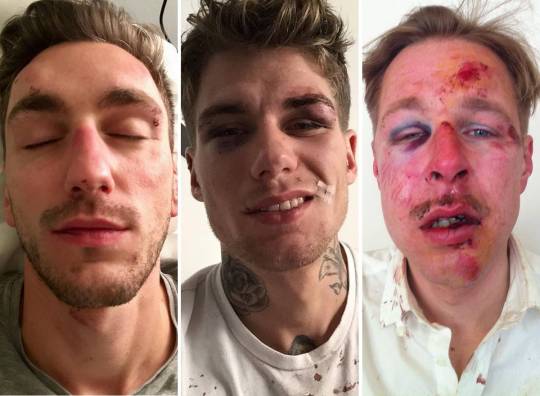
Social Media was full of openly homophobic tweets and Facebook posts. Poetic phrases like “Beeeeeeeeeeurk dans mes amis sur Facebook y’a une gouine”, “#BrulonsLesPD”, “#LesGaysNeSontPasHumainsCar” or “#LaFranceSansGays”. And don’t think for one second that the anonymity of the internet was the main reason for those statements. They were, but it was so bad back then, you would still hear them out loud ON THE FUCKING STREET.
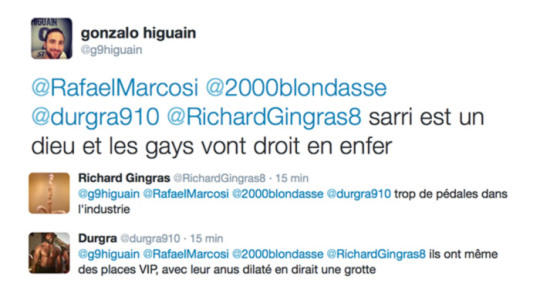
AND THEN IT HAPPENED

On February 2, 2013, The Assembly approved the first article of the bill, legalization of same-sex marriage, 249 to 97. Opponents then introduced more than 5,000 amendments to the bill in order to slow down its passage. By February 12, the bill as a whole won 329–229 and was sent to the Senate. Same story starting there starting April 4th. First article approved 179–157. By April 23rd, with minor amendments, the bill came on top with 331–225. François Hollande promulgated the bill, commonly known as “Loi Taubira” in reference to its main sponsor, as law on May 18th, 2013. The first same-sex marriage took place in Montpellier on May 29.
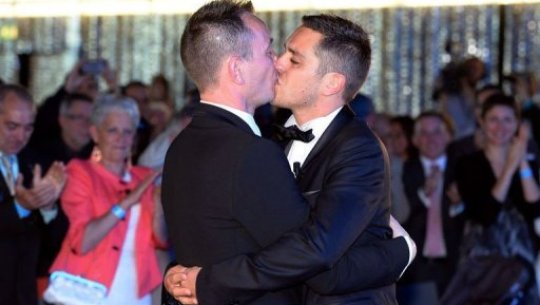
146 mayors challenged the law and refused to officiate marriages for same-sex couples. Just so you know, a refusal to implement is considered discrimination based on sexual orientation and is punishable with up to 5 years imprisonment and a 75,000 euros fine. Their cases were send to the European Court of Human Rights in vain, as their were dismissed in October 2018. As of 2018, 40,000 same-sex marriages have been celebrated in France, approximately 3.5% of all French marriages in the 5-year time frame.
THE FIGHT HAS JUST BEGUN. YOU KNOW THAT, RIGHT ?
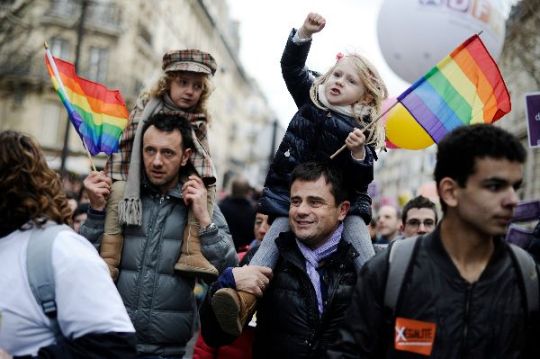
We talked laws. We talked Homophobia. We talked Fear. I know want to share an impression of the Post-Mariage pour Tous situation that I’ve shared many times with friends, who mostly agree with me. It seemed that after the gigantic milestone was sealed and done, and the celebrations of the 2013 pride went according to plan, there was some sort of general drop of shoulders from Gays and Lesbians all around the country. The common attitude felt like an extension of the commonly heterosexual thought that now that we had marriage, we were all good and equal under the law. Well, absofuckinlutly not. While we have the right to marry and adopt as Queer couples, it didn’t come with IVF (In Vitro Fertilisation) for lesbian couples or any types of surrogacy for same-sex couples. Also, Gay men are still discriminated by the Law by not being able to give blood unless we’re a year abstinent. And for fuck’s sake, what about Trans rights ? Don’t you care about your Trans brothers and sisters ? That’s a story for tomorrow. Just know, dear Queer who is totally satisfied by the current situation, now that you have what you want, isn’t time to focus on those who don’t ? Wouldn’t be fair for this year’s pride to be all about parts of the community who is still search for their right to exist ?

See you then.
0 notes
Text
The Wild, Messy Road to Oscar Night 2019
This Sunday is already guaranteed to be a historic night for the Oscars. But aside from its highly unpredictable results, tuning into the Academy Awards this year feels to be based more in morbid curiosity than the usual sense of celebration: these past few months have been extremely awkward and public for the Academy of Motion Picture Arts and Sciences, and it’s clear we're seeing the Oscars in the middle of a major identity crisis. At the age of 91, Oscar is torn between being a popular television event and being the one time a year when a worldwide television audience can appreciate the art form of movie-making beyond looking at mega stars. We’ll see on Sunday where this season's wild course of events has taken us, but as of now, the Oscars are like an enterprise without assured direction, and an industry bonanza that threatens to call out its blatant lack of progress with its top winners, instead of its desire for it.
Let’s take a step back to August 2018. It was a slightly more innocent time. No one had seen Bradley Cooper’s “A Star is Born” yet, but it smelled like the multi-Oscar winner to beat. It also felt like Lynne Ramsay or Debra Granik or Chloe Zhao might even pop up in the Best Director category, and that it wouldn’t be an all-male roster this year. You know, those types of dreams.
But nonetheless, the Academy had a strange development for us on August 8: the introduction of the Best Popular Film category, the qualifications for such an absurd award to be revealed later. In natural fashion, we memed about it quickly, but ignored the stuff under the headline: Inside the “Best Popular Film” announcement was a note about how not all the awards were going to be broadcast, though it was not listed what they would be. From August, the Oscars introduced their new attitude: it wasn’t concerned with the movies so much as popularity. It wouldn’t be the last time they lost a sense of their true self to the cause of being liked and powerful.
The Oscars have bungled their attempts at such popularity, even when it brought on one of Hollywood’s biggest stars to host. Kevin Hart was originally brought on in December to take the role, something that he had previously talked about as a career goal. But he refused the Academy’s demand to apologize for homophobic jokes (on Twitter and on stage), citing that he had already touched upon that material in previous times. Hart did eventually apologize, but it came in the same tweet as an announcement that he was stepping down from the hosting position, “to not distract from the amazing talented people,” he wrote. In an interview with Josh Rottenberg at the Los Angeles Times, the producers shared that they had considered going host-less back in October—even if that is the case, the void of a host has now become a type of mascot for a show that is relying on a lot of people behind the scenes to help give it an on-stage personality.
The Oscars have long been concerned with its runtime. One solution was floated around from industry insiders, with the consideration that only two songs from its Best Original Song category would be performed at the show. Variety had heard from multiple sources that Kendrick Lamar & SZA’s “All the Stars” from “Black Panther” and Bradley Cooper & Lady Gaga’s “Shallow” from “A Star is Born” were the select two, though the Academy never confirmed which tunes it would be—but the let’s assume that one of them wasn’t “When a Cowboy Trades His Spurs for Wings” from “The Ballad of Buster Scruggs.” It was a reflection of the Oscars’ disinterest in showing off the diversity of its roster, and weak interest in accommodating popular taste.
Within days it was publicly confirmed that all songs will be performed, but two more developments have already occurred: “All the Stars” will now no longer be presented, as Kendrick Lamar has said that he doesn’t have the time to prepare a proper performance for the song. And in what will certainly be a boost in the right direction, and put “Bohemian Rhapsody” even more center stage, Queen will be opening the show.
Not even winners from last year could escape the Academy’s isolating and self-inhibiting new attitude, as Oscar pretended to not know the likes of Allison Janney, Sam Rockwell, Gary Oldman and Frances McDormand, recipients of acting awards last year. In an Instagram post that was deleted shortly after being posted, Janney expressed her initial heartbreak at not being asked to present this year, a decision from the Academy that would go against the usual tradition of having past winners on stage to announce the latest winners. The Oscars cemented that she was invited with a tweet that soon followed, but it was another moment in which the awards show looked like it had lost its way.
But Oscar saved perhaps its most dramatic touch for last. On February 13, it was announced that the four major awards would not be shown in the live broadcast. with two to three-million-dollar commercials to air in their place: Best Cinematography, Best Editing, Best Live-Action Short, and Best Makeup. I use the word “major,” not just because there are no categories more worthy of screen time than others, but because they’re essential to the very existence of movies. An impressive amount of Academy members, not just filmmakers, responded immediately, co-signing a letter that quoted a Seth Rogen tweet. Again, the Academy took back its decision. But even just the glimpse of an Oscars that openly did not value cinematography or make-up more than it did time for commercials, was incredibly disturbing and disheartening.
As for the actual top contender movies this year, well. We can debate the quality of “Green Book” and “Bohemian Rhapsody,” but it’s clear that they are problematic. “Green Book,” an offensive Peter Farrelly film and not in the intended way, had its story of brilliant pianist Dr. Shirley (Mahershala Ali) and his chauffeur dismissed by family member Maurice Shirley to Shadow & Act as “a symphony of lies,” down to the detail where Dr. Shirley is removed from his family in the story. In the larger picture, it’s queasy that this tale about an exceptional and talented black man is told from the perspective of a mediocre white man, that of Viggo Mortensen’s Tony. Add in co-writer Nick Vallelonga’s history of an anti-Muslim tweet (which he has since apologized for), and it’s nauseating to think about how “Green Book” epitomes the problems about who is the storyteller in certain cases, and how that perspective then directly impacts how a narrative is framed.
Then there’s “Bohemian Rhapsody,” which is my current pick for “This Will Win Best Picture, But Absolutely Shouldn’t.” It’s only been a year since #MeToo and #TimesUp, and yet the film’s campaigning has been able to dodge that it’s been directed by Bryan Singer, the subject of numerous sexual assault allegations. Best Actor contender Rami Malek has been able to navigate a season that has welcomed his imitation of Freddie Mercury, and the editing has been hailed for simply getting it to the finish line. That’s just the politics though, as the movie itself, aside from its weak portrayal of Freddie Mercury’s sexual history and its Three Stooges-esque, PG-13 depiction of a prominent rock band, is blatantly dishonest. That hasn’t stopped the movie from becoming a frontrunner, but it’s again nauseating to think that a movie would value a shiny image and its song catalogue over looking at its subject’s history head on, or at least not working with a filmmaker, accused on multiple occasions before production even began, of being a pedophile.
This Oscar season has been so backwards that the “smear campaigns” brought against these two films in particular were more about showing the true heart behind these productions than taking unfair swipes at the respective projects. Politically timed as they may be, the various pieces and revelations that challenged each individual movies’ PR campaign only revealed the superficiality in which they told their very complex, human stories, all for the sake of achieving a rotten crowd-pleaser status that in turn made them so awards-friendly. If “Bohemian Rhapsody” were to win Best Picture especially, it would only affirm just how selective our collective memory is, or that the act of canceling has more asterisks than some may think in a post-Harvey Weinstein era.
As much as I’m curious about who will win and what the ceremony will even look like on February 24, I’m excited most about what’s going to happen after. With this Oscar season officially behind us come Monday morning, the powers that be will have a new shot at stabilizing what the Oscars should celebrate, and what values are most important to the ceremony. The extremely public nature of this season's messiness has me hoping that they’ll be considering the past choices of what not to do, of what parts of tradition to not touch. I have hope that they’ll see how movie fans have become so outraged. We’re protecting a special part of movie love—the ability to support projects we think are worthy of such distinction, and the thrill of watching talented individuals, not just movie stars, ascend to golden prominence. Along with the movies themselves, it’s a huge part of what keeps us coming back to the Oscars each year.
from All Content https://ift.tt/2GEgPyg
0 notes
Text
Why I Used The Pen Name, Lord Wilde

Again, today Tracy Terhune chose to identify himself from something I wrote many years ago. This was his choice and his choice alone. But I wish to address this point he made today.. because if taken out of context, this line is deprived of its true meaning.
In 2011-2012, I wrote a small book with a life-long friend of mine. (See above) The book is titled, Buddha's Tooth and Morphine and it stands as his story of recovery from a violent hate crime which left him dependent on pain medication. He traveled to Sri Lanka to seek an Ayurvedic cure for his ailments because he felt western medicine was all too addictive and dangerous. This book tells his remarkable journey and the ultimately tragic consequences. After years of struggle for his sobriety and sanity, my friend suffered a massive stroke in 2012, which left him unable to speak, read or write. Since that time he has been confined to a nursing home. And so today, Tracy Terhune brings this subject to the forefront in his epically waged battle to destroy my reputation, all of my books and everyone remotely associated with me.
My friend is gay. This matters here because when David Bret discovered this little book, which I thought to have him never discover, he launched unthinkable homophobic posts about him. I opened a blog for a while to address this and fight back. If Tracy Terhune will recall, David Bret immediately wrote one of his perverted spoofs about my friend; wielding every possible gay stereotype, saying he was a pedophile, that he went to Sri Lanka only to abuse boys and much, much worse. David Bret's homophobic spoof about my friend is still online.
David Bret claimed that because he inserted a "C." in the middle of my alias and because he ever so slightly twisted the name of my friend, this made his homophobic vile piece ok. It did not and still does not. In the citation Tracy Terhune posted today as excerpted from my Lord Wilde blog, I was responding to David Bret by asking how he would feel if I did the same with his friend's names to generate such wicked and defamatory spoofs.
I remind Tracy Terhune that at that time, he had opened the blog under my book's title and had by then openly allied with David Bret against me for almost two years. By then I was tragically run down and this was all I could do. I ran the Lord Wilde blog for a while but it has been closed for three years.
And for this day’s record, I did not use my blog under my book's title, which Tracy Terhune has run now for 6 years...I never used it to bully anyone, but as always in my endless effort to defend myself and try to have some truth about me and my work known. I have never written cruel spoofs about anyone and never would. It is a reprehensible thing to do and the very definition of cyber bullying. I was making a point to David Bret in an effort to make him understand how it felt to have your friend so debased.
I was extorted into closing the blog under my book's title in the fall of 2011, because David Bret threatened to open blogs where he would attack my family members in the same way. I felt I had no choice in the matter and closed the blog never realizing that I could have just taken it offline. I was fairly terrified and in hindsight I guess I panicked. This is how Tracy Terhune found that my blog URL was available and seized it; to use it against me all of these years and up to today. Today, incredibly, he declares proudly that indeed he seized my blog to use it against me.
My alias of Lord Wilde was set up when I wrote Buddha’s Tooth and Morphine, because I was under such vicious attack by those same damn people who carry on against me today. Yes, here it is folks... another book I wrote which they bullied badly which was the source of David Bret's homophobic slurs, homophobic stereotypes and cruel abuse of a man who can not respond.
This is the book they also tried to destroy with a homophobic spoof by twisting my friend's name.. and it is available at @ https://amzn.to/2GUMEPc The Instagram account can be found @ https://www.instagram.com/buddhas_tooth_and_morphine/
0 notes